Public speaking can be daunting for anyone, but for children, it can be especially challenging.
Over the coming few weeks, students from public primary schools across New South Wales will be preparing for and presenting their submissions for the Multicultural Perspectives Public Speaking Competition. This is one of the biggest public speaking competitions in Australia, and is run by the Arts Unit (which forms part of the NSW Department of Education), with around 2,000 students representing NSW Government Primary Schools each year in the finals series.
Given many primary schools would have dozens of students clamouring for this opportunity, most hold their own internal public speaking competition to select four representatives – one from each of Year 3 to Year 6 – to represent them in the finals series.
This can be quite an experience, especially for primary school students who only have minimal experience with public speaking – but it also represents a great way for students to build confidence, develop communication skills, and learn about different cultures.
If your child is planning to participate in the NSW Multicultural Perspectives Public Speaking Competition, here are some tips on how they can approach preparing their speech.
What is the format for the Multicultural Public Speaking Competition?
Formally, there are two elements to the NSW Multicultural Perspectives Public Speaking Competition – a prepared speech and an impromptu speech.
That said, for the preliminary public speaking competition at most schools, students are limited to just the prepared speech.
In terms of rules for the public speaking competition, they are generally quite simple. Whilst schools are entitled to set their own, all the students are generally required to:
- Choose one of the set topics for the public speaking competition (see below), which will form the basis of their speech;
- Ensure their speech conveys a message that relates to ‘multiculturalism’, ‘multicultural themes’ or ‘multicultural perspectives’;
- Reach the speaking time (which can also be seen below), making sure to stop before the warning bell; and
- Only use themselves and any prompts (like palm cards) – props and external aids are not allowed in the public speaking competition, nor can they use a lectern or microphone.
The time periods are also spelled out quite clearly, with students:
- In Years 3 & 4 being expected to reach 3 minutes (with a warning bell at 2 minutes, and a continuous bell at 4 minutes); and
- In Years 5 & 6 being expected to make 4 minutes (with a warning bell at 3 minutes, and a continuous bell at 5 minutes).
For those four primary school students who are selected to represent their public school, they will then move on to three levels of finals:
- A local final, which will be open to around 2,000 primary school students from across New South Wales, with the winners progressing to…
- A regional final, which will be whittled down to the best primary school students in each region, with the winners progressing further to…
- A state final, which will be open to the top public speakers in the state.
The local final, regional final and state final are held across the year – you can find out more about the Multicultural Perspectives Public Speaking Competition on the NSW Arts Unit website here.
What are the topics for 2025?
Each year, the topics for the Multicultural Perspectives Public Speaking Competition change – some topics from past years have included ‘In my language‘, ‘Australia on the screen‘ and phrases as simple as ‘Healing‘.
For 2025, there are separate topic lists for the two different age groups in the public speaking competition, each centring around different multicultural themes.
For Years 3 & 4, the Multicultural Perspectives Public Speaking Competition topics are:
- Learning together
- Sport brings people together
- What makes a good leader?
- The same but different
- Watch your language!
- Colour matters
- When does a migrant become an Australian?
- Welcome!
- Learning from the past
- No hate – just mates
- How far have we come in 30 years?
Whilst the Year 5 & 6 Multicultural Perspectives Public Speaking Competition topics are:
- Learning together
- Diversity and inclusion
- Multiculturalism and politics
- Sport – welcome to the club!
- Peace and trust
- Names matter
- Everyone has a story
- What happens there matters here
- Technology and multiculturalism
- Rebuilding
- How far have we come in 30 years?
How should I prepare?
Great question – there are lots of ways to help give yourself an edge!
Check out the below to learn more about how to use your public speaking skills to their best advantage in the Multicultural Perspectives Competition.
Tip #1 – Check the official marking rubrics
A good place to start is to give some thought to what your judges might be looking for.
The Arts Unit has prepared a handy guide that can be found online here that looks at their advice for speakers and the public speaking skills they’re looking for – but in summary, students should:
- make sure that they speak to time, but don’t reach the continuous bell;
- put a strong emphasis on natural, conversational and relaxed speaking manner (so students can properly show off their public speaking skills);
- pick a public speaking topic from the provided lists (please see above), and ensure that their speech centres around multicultural themes or multicultural perspectives relating to that topic;
- make sure that their speech has an opinion or perspective on the topic that they are using to persuade their audience;
- present a balanced approach to public speaking, with a mix of things like big picture and personal, emotions and facts, and humour and sincerity; and
- follow, at least in part, a relatively standard speech structure – a catchy introduction, a body that explains 2-3 points and a conclusion that leaves audiences with a clear idea of what should happen next.
Many schools will also publish their own marking rubrics for the public speaking competition as well, which will give a better understanding of what your teachers are looking for when deciding who to put through to the finals. The public speaking skills each primary school is looking for will vary, but will generally involve some balance between the 3 M’s – Matter (the content), Method (the structure) and Manner (the way it’s presented).
Please keep an eye out for one of these if your public school has distributed it!
Tip #2 – Picking the right speech topic
One of the nice parts of the NSW Multicultural Perspectives Public Speaking Competition is the number of topics that the primary school students are provided with – whilst everyone must speak about multicultural themes or multicultural perspectives in some way, the variation and range of topics make it much easier for all the students to pick one that suits them!
We’ve pulled together a blog that focuses solely on this point which you can access here, but in summary:
- Have a look at the topics provided by the Arts Unit, and give each of them some thought about what they might mean;
- Brainstorm a list of topics that interest you and explore ideas related to those topics;
- Narrow down your list to a few speech topics that you feel passionate about;
- Decide on the purpose of your speech (do I want to inform, entertain or persuade my audience);
- Choose the topic for the public speaking competition that you can talk about most confidently and convincingly and use to show off your public speaking skills; and
- Do research on the topic to make sure your information is up-to-date, accurate and serves the aims of your speech!
Importantly, whilst some of the topics can have general meanings – think ‘Privilege‘ or ‘Voyages‘, it’s important to remember that the central concept needs to revolve around multicultural perspectives or multicultural themes – it is crucial to ensure that your message relates to this!
If you’re having difficulty coming up with a topic that suits you for the public speaking competitions, we’ve also put together a range of strategies that can help – you can check out a blog on interpreting speech topics here!
Tip #3 – Pull together your speech body
Whilst you always begin with an introduction when presenting, this isn’t actually how you should start your preparation for a public speaking competition.
Instead, it is almost always better to begin writing the body paragraphs of your speech first.
There are lots of ways that you can explore ideas and pull together points for a speech for a public speaking competition, but the main ideas you should keep in mind are:
- Body paragraphs are the heart and soul of a speech, typically comprised of three paragraphs.
- PEEL is a popular structure for body paragraphs; Point, Explain, Example and Link.
- Writing for speeches should keep in mind that its purpose is to be read aloud (which will have an impact on word choice and sentence length).
Rather than writing long lists of tips and tricks, the best way to learn more about preparing your speech paragraphs is to check out the below videos from our YouTube channel!
Tip #4 – Capture your audience’s attention
A good speech should have a clear and engaging introduction that captures the audience’s attention and shows off your public speaking skills.
Encourage your child to start with a strong hook – something that grabs the attention of their audience – rather than simply starting with their name and topic (which comes later).
We’ve got a detailed blog on how to start speeches for kids, but in summary:
- Many people feel anxious when they have to speak in front of an audience, especially in public speaking competitions where there is something at stake.
- Introductions are key – they should be engaging and excite the audience, especially children.
- Using a structure like CATS – Catchy Opening, Address the Audience, Topic and Signposting – can make a real difference.
- Starting with a personal anecdote or rhetorical question can be effective in grabbing attention.
- Bold statements, statistics and quotes may also work, but are often done poorly.
- When writing the introduction, keep it simple and focus on just one idea (which can be backed up by multiple arguments).
Finally, given audiences will make a strong first impression based on your introduction, it is very important to get things right – make sure that you practice it multiple times, so you sound confident and coherent when presenting!
Tip #5 – Conclude your speech with a strong call to action
Similarly, a good conclusion should summarise the main points of your speech and leave the audience with a lasting impression.
Encouraging your child to conclude with a call to action or thought-provoking question can help them to improve their speechwriting skills and their ability to communicate effectively. Not only can this make their speech more engaging and persuasive, but it can also encourage their audience to take action or think more deeply about the topic at hand.
One common structure for conclusions is ‘ESC’, which stands for:
- E: Ending Phrase – Use a short, easily understood phrase to let the audience know you’re concluding your speech (e.g. ‘In conclusion’).
- S: Summarise – Summarise the main ideas in your speech – this could be a list, but it is often more effective to summarise the key idea.
- C: Call to Action – Give a call to action or a thought-provoking question that leaves the audience understanding what you want their next step to be.
By developing this skill at a young age, your child will be better equipped to succeed not just in any presentation they may need to give, but in all areas of their life where communication is key.
Tip #6 – Practice, practice, practice
Preparing a speech doesn’t end once it’s been written.
Practice is key to delivering a confident and effective speech. Encourage your child to practice their speech in front of a mirror, family members, and friends.
Whilst speaking manner is viewed holistically by judges, it is important to pay attention to its elemental parts that build into the whole. The types of things that judges will often be looking for might include:
- Stance – how you hold yourself (ideally with a confident stature)
- Body language & gestures – how you use your body to convey meaning
- Eye contact – how often you look up at the audience
- Enunciation – how easily your words are understood
- Pace – the speed with which you talk, and the pauses that you take
- Tone & Expression – where you place emphasis and emotion in your voice
For each of these things, the most important thing is to be natural – you don’t need lots of hand gestures, and you shouldn’t be artificially looking up at the end of every sentence with a cursory glance. Try to make each of these things appear as conversational and natural as possible, and you’ll be a long way to presenting an engaging speech.
Whilst there are plenty more things that you can focus on, the most important thing is not to try conquering everything in one go – pick something, work on it, and then move on to the next thing. It’s impossible to focus on everything at once, which is why we use habits – actions we don’t really have to think about, but just do instinctively. The aim of practising is to ingrain at least some of these habits to make the actual presentation better.
One last thing to note is that the NSW Multicultural Perspectives Public Speaking Competition encourages students not to memorise their speech – even if they’ve reached the local final or even state final – but instead use dot points on their palm cards. This means that you don’t need to learn it word for word – which, especially in younger people, often ends up with a relatively mechanical display. Instead, you are able to present as naturally as possible with the aid of prompts if you get stuck.
If you’re looking for suggestions on how to improve your speaking manner, check out one of our Speak to Inspire videos below!
Tip #7 – Get feedback and revise
Finally, encourage your child to get feedback on their speech and revise it for the public speaking competition accordingly.
Speechwriting doesn’t end when you’re ready to start practising – instead, you should ask for feedback from teachers, coaches, or anyone who can provide constructive criticism. Having received this feedback, you should consider any suggestions for improvement and make revisions as needed.
If you reach a local final, or end up going even further to the regional or state final, make sure to keep in mind that your speech isn’t static – you are welcome (and even encouraged) to continue to refine it as you progress!
Keep in mind that the goal of the Multicultural Perspectives Public Speaking Competition is not just to win, but also to learn and grow as a speaker.
Dealing with nerves
It’s entirely natural to feel anxious before delivering a speech or presentation, especially when it involves a public speaking competition.
However, it’s important to stay positive and to try some calming techniques. Take a few deep breaths and remind yourself that you’ve prepared for this. Trust yourself and your instincts and try to maintain a calm and confident demeanour throughout the presentation.
With a clear head, you can deliver your message with conviction and poise, impressing your audience and persuading them to your perspective with ease. Remember, everyone in the public speaking competition is in the same boat – they’ve either just given a speech, or will need to give one soon. The audience is on your side.
The worst thing that can really happen is forgetting what comes next, and even then, that’s okay – take a breath, make sure you’ve got your cards numbered, find your place and keep on going. You’ve got this.
Was some more information on how to deal with stage fright? Check out our blogs on beating the fear of public speaking and overcoming stage fright, or the below Speak to Inspire video!
What about impromptu speeches?
So, you’re one of the local finals speakers, or heading to the regional finals of the public speaking competition. You’ve crafted a magnificent speech using all the tips we’ve provided, but wait, there’s more!
Following the prepared speeches, you’ll need to deliver an impromptu speech – a compulsory part of the Multicultural Public Speaking Competition weighted equally to the prepared speech once you reach the finals series.
Whilst this doesn’t always appear at preliminary school rounds, some schools do use it as a tie-breaker when the teacher can’t decide between the prepared speeches, so it’s worth knowing how it all functions!
What’s going to happen?
At the public speaking competition, you’ll be ushered into a quiet room, seated at a desk and presented with an ostensibly random topic. And then the clock starts ticking! You’ll have a mere five minutes to build a brief presentation. No notes or plans can be worked on beforehand – just blank paper and palm cards to guide you.
The topic will be generic enough to leave plenty of room for interpretation, but rest assured, everyone at the public speaking competition will get the same one! It might seem daunting, but we promise, it’s not as scary as it sounds!
What are the rules?
The rules are set out by the Arts Unit, but can be summarised as follows.
First up is timing. All primary school students will receive the same five minutes of preparation time, with the following speaking times for each division:
- For Years 3 & 4, students should aim to reach 1 minute (with a warning bell at 30 seconds, and a continuous bell at 1:30); and
- For Years 5 & 6, students are expected to reach 2 minutes (with a warning bell at 90 seconds, and a continuous bell at 2:30).
It is important to not just fill the time with rambling, though – just like a prepared speech, the content you’re providing should be as concise as possible!
Second is the topic.
In 2023, the state finals impromptu speeches centred on ‘Impossible‘ for Years 3 – 4 and ‘Under Pressure‘ for Years 5 – 6.
Whilst you could explore ideas relating to multicultural themes or multicultural perspectives for either of these topics, it’s important to remember that this is not only unnecessary but is in fact actively discouraged. Judges are looking for fresh expressions that distinguish impromptu presentations from prepared ones. Using content from prepared speeches, whether your own or someone else’s, is not recommended, so it’s generally better to simply avoid multicultural themes altogether.
Third and finally is how the impromptu presentations are judged.
The rules of what makes a good impromptu speech are exactly the same as for the prepared section of the public speaking competition:
- Matter – It’s best to choose a single focal point to present instead of a jumble of ideas that lack direction. After all, you want the audience to remember something unique and interesting, not a rundown of mundane details. With that said, always aim to differentiate yourself from the other competitors by discussing a topic that’s captivating and a little bit different.
- Manner – It’s important to present your impromptu speech with the same poise and confidence as your prepared speech.
- Method – Just because it’s an impromptu speech doesn’t mean it should lack structure. You still need an introduction, a body and a conclusion.
Preparing for unprepared speeches
Despite limited preparation time in the actual public speaking competition, it is actually possible to prepare for an unseen topic – the best way to prepare for an impromptu speech is three-fold.
First, familiarise yourself with different speech structures you might be able to use in a pinch. Given impromptu speeches are substantially shorter than prepared speeches, the structures will often be different and only involve presenting one point.
Second, prepare a range of engaging and interesting anecdotes that you can bend to the topic. These may be from your own lived experience, or otherwise be things that you find engaging and can speak passionately about.
Third, practice with a list of impromptu speaking topics – whilst you can source these yourself, you can also look at some topics we’ve collated here.
Still not sure how to prepare? Check out some of our Speak to Inspire videos below to learn more!
Preparing for the Multicultural Perspectives Public Speaking Competition can be a rewarding experience for primary school students across New South Wales.
By choosing a topic they are passionate about, researching it thoroughly, writing an engaging introduction and conclusion, practising their delivery, and getting feedback and revising, they can develop valuable communication skills and confidence.
Encourage your child to approach the NSW Multicultural Perspectives Public Speaking Competition with a positive attitude and a willingness to learn and grow.
Good luck!
Looking to craft a convincing speech to effectively persuade your audience and grab their attention?
This blog will run through how children can master persuasive speaking by choosing the right topics, structuring your speech effectively, and delivering it with impact.
Key Takeaways
-
Master the three pillars of persuasion – ethos, pathos, and logos – to create compelling arguments that resonate with your audience and appeal to the audience’s emotions.
-
Choose topics you are passionate about and tailor your presentation to your audience’s interests, enhancing engagement and effectiveness.
-
Deliver your speech with confidence, using strong body language and purposeful pacing, while ensuring a clear, impactful conclusion with a call to action.
Understanding Persuasive Speeches
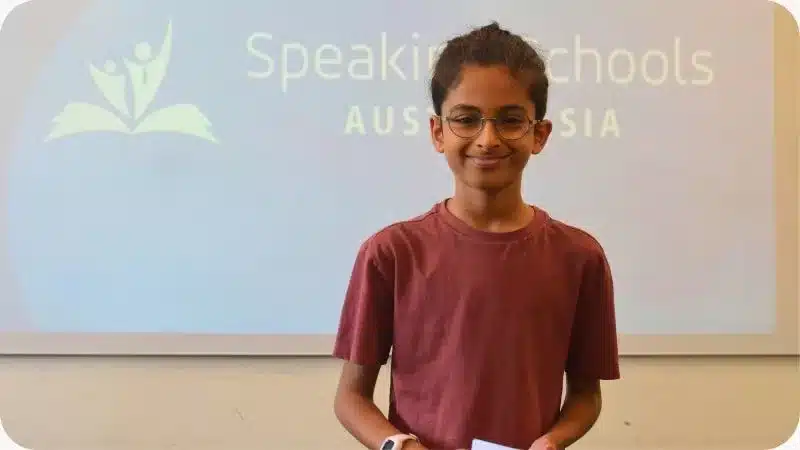
A persuasive speech is more than just a talk; it is an argument or set of arguments presented to convince an audience believe, feel, or do something.
Persuasive speeches differ from informative speeches in their core objective. While an informative speech aims to convey information, a persuasive speech seeks to change someone’s mind or inspire action. However, a persuasive speech can also inform if it helps achieve the goal of persuasion.
Understanding the true essence of a persuasive speech sets the stage for crafting one. It is about creating a message that resonates, engages, and ultimately convinces your audience. Mastering public speaking allows you to influence others in debates, speeches, or even casual conversations with friends.
Crafting a Persuasive Speech Outline
Crafting a detailed outline is a crucial step in delivering a successful persuasive speech, especially for children. A well-structured outline helps you organise your thoughts, ensure a logical flow of ideas, and effectively convey your message to the audience.
Here’s a step-by-step guide to crafting a persuasive speech outline:
-
Define Your Goal: Clearly define the purpose of your presentation and what you want to achieve. What action do you want your audience to take? Having a clear goal will guide the rest of your speech preparation.
-
Choose a Topic: Select a topic that resonates with your audience and is relevant to the occasion. Make sure you’re passionate about the topic, as it will make your speech more engaging and authentic. Good persuasive speech topics are those that spark interest and discussion.
-
Conduct Research: Where relevant, gather credible sources to support your argument. Use objective research to build a strong foundation for your speech. This will help solidify your understanding of the topic, enhancing your credibility and providing solid evidence to back up your key arguments.
-
Develop a Thesis Statement: Craft a clear and concise thesis statement that summarises your main argument. This will serve as the foundation of your speech and keep you focused on your primary message. Don’t overcomplicate things – your central thesis should be a simple statement or question. Make sure you refer back to it regularly – all of your main points and ideas should flow back to your central thesis and bolster it.
-
Organise Your Main Points: Identify the key arguments that support your thesis statement. Use logical arguments, emotional appeals and concrete evidence to build a strong case. Aim for two or three main points to keep your audience engaged without overwhelming them. Does each point back up your thesis? If not, you should scrap it and look into other ideas.
-
Address Counterarguments: Anticipate potential counterarguments and address them in your main points. This will show that you’ve done your research and are prepared to respond to opposing views, enhancing your credibility.
-
Create an Attention-Grabbing Introduction: Craft an introduction that grabs the audience’s attention and sets the tone for your speech. Use a hook, such as a story, a joke or a rhetorical question, to engage your audience right from the start. You should usually avoid startling facts, statistics and quotes – these generally don’t engage anyone.
-
Develop a Strong Conclusion: Summarise your main ideasand reiterate your thesis statement. End with a call to action that leaves a lasting impression on your audience. A strong closing statement can motivate your audience to act on your message.
Understanding Your Audience
Understanding your audience is crucial in delivering a successful speech. Knowing your audience’s demographics, interests, and concerns will help you tailor your message and increase its effectiveness. Here are some tips to help you understand your audience:
-
Research Your Audience: Gather information about your audience’s demographics, interests, and concerns. Use this information to tailor your message and make it more relatable. Understanding who your audience members are will help you connect with them on a deeper level. Speaking to your class or your teacher? You should already know them pretty well!
-
Consider Their Values and Beliefs: Understand what your audience values and believes in. This will help you appeal to their emotions and values, making your speech more persuasive. Aligning your message with their core beliefs can significantly enhance your persuasive power.
-
Identify Their Needs and Concerns: Identify your audience’s needs and concerns. Address these concerns in your speech and provide solutions that resonate with them. Showing empathy and understanding can build trust and make your message more compelling.
-
Use Language They Understand: Use language that your audience understands. Avoid using jargon or technical terms that may confuse them. Clear and simple language ensures that your message is accessible to everyone, but especially other children. This may change depending on the audience – a room full of scientists will know the word ‘osmosis’, but your any school-aged student who tunes out in biology or an audience of lawyers probably doesn’t.
-
Make It Relevant: Make your message relevant to your audience’s lives. Use examples and anecdotes that they can relate to. Personal stories or real-life examples can make your speech more engaging and memorable.
Key Elements of a Successful Persuasive Speech
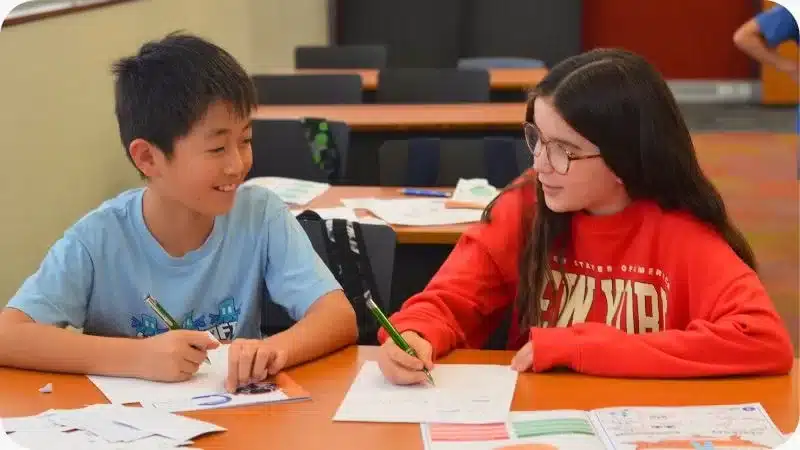
Crafting a successful presentation involves mastering the three pillars of persuasion: ethos, pathos, and logos.
Ethos involves building trust and demonstrating authority on the subject matter, which can be achieved by showcasing your credibility and expertise. When your audience believes in you, they are more likely to be persuaded by your arguments. You can also utilise other things to build a sense of competence – think of politicians standing in front of flags or principals behind lecterns with the school logo. Ethos isn’t just the speech itself, but is also determined by the context you give it in.
Pathos, or emotional appeal, plays a significant role in persuasion. It can invoke a range of emotional responses, from humor to love, which enhances the persuasive impact and gets your audience onside. Humans are better with emotions than facts because they use a different, simpler part of the brain. Emotions can be a powerful motivator, and connecting with your audience on an emotional level can make your message more impactful. Use storytelling, anecdotes, and vivid language to appeal to your audience’s emotional core. Creating an emotional connection makes your message more relatable and compelling.
Logos refers to the logical appeal of the speech. Use facts, statistics, and evidence to build a strong case and effectively persuade your audience. Logical ideas provide a solid foundation for your message and help convince your audience through reason. But don’t rely too heavily on this – people tune out when things become too factual, and you need to remember to emphasise the Pathos of your speech as well!
By effectively combining ethos, pathos, and logos, you can create a persuasive speech that resonates with your audience and inspires them to take action.
Choosing Persuasive Speech Topics
Choosing the right persuasive speech topic is crucial for a successful presentation. Understanding your audience enables you to tailor your speech effectively. This will help it resonate with their interests and concerns. Selecting topics that align with your personal interests can also enhance the engagement level of your speech.
Good examples of persuasive speech topics are interesting, relevant to the audience, and can spark controversy and discussion (but not too much controversy and discussion). Remember, audiences have limited time and attention, so the best persuasive speech examples are simple yet impactful.
As always, the question you should be asking yourself is: ‘What is the one thing you want your audience to walk away with?’ Everything in your presentation should be targeted towards achieving this goal.
Passion is Key
Passion is the driving force behind an effective persuasive speech. When you choose a point of view you are passionate about, it significantly improves the effectiveness of your speech. Your enthusiasm can drive the audience toward embracing your viewpoint.
A speaker’s passion enhances their credibility and makes their arguments more compelling. A passionate delivery can increase audience engagement and retention of the message. Whether it is the main character of your favourite game, sports teams, or your political opinion on current affairs, your passion will shine through when speaking on a topic you’re passionate about.
Avoid Common Pitfalls
Choosing the right topic is essential for persuading your audience effectively and ensuring a favourable reception. A point of view that resonates with your audience’s interests and values (but doesn’t simply mirror them back) will increase engagement and help persuade your listeners.
Avoiding overly controversial topics minimises the risk of alienating your audience and detracting from your main argument. That said, some controversy is still necessary – dull topics can lead to disengagement, whilst ensuring your subject is dynamic and stimulating keeps your audience invested. Incorporating interesting anecdotes or relevant examples related to your point of view can enhance audience connection and retention.
Structuring Your Persuasive Speech
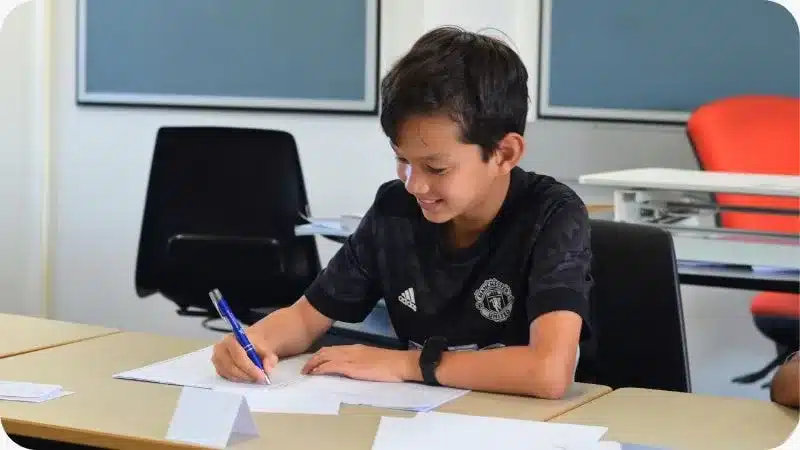
A clear goal and outline are the foundation of a successful presentation. Begin by identifying and structuring your key arguments, ensuring each is supported by solid evidence to enhance credibility. Whilst you may be sure that something is correct, you should also always check your facts. Tailor your presentation to the audience’s age, gender, culture, and shared interests to ensure engagement.
Use smooth but distinct transitions between points to help maintain a logical flow, making your opinion more coherent. Make sure that there is only one main goal or question that you are answering. If you aim to achieve more than one thing, choose what is most important, as the other goals are secondary to your main goal, particularly at this particular point.
This leads to the three components of an effective presentation tailored to persuade others.
Strong Introduction
A strong opening is crucial as it grabs the audience’s attention and sets a positive first impression. An engaging introduction starts with something to engage your audience. Stories, jokes, and rhetorical questions often work well as an attention-grabbing statement, but facts, statistics, and quotes usually make an audience yawn, so you should avoid them.
Make sure to choose your catchy opening based on the audience. A joke might land great with your peers but may be completely inappropriate for parents and teachers. Remember who you are talking to!
Presenting Key Arguments
Logic (Logos) serves as the foundation of your arguments, guiding the audience toward a necessary idea. Select two or three main arguments (with your strongest argument coming first) to maintain audience interest and effectively support your stance. Try to avoid four or more arguments, as the more arguments you choose, the more likely your audience is to switch off. Three is usually the magic number.
Use objective research and examples to support your arguments in a persuasive speech, as this showcases logic and credibility. But do not stop there. Logic is critical, but humans do not necessarily listen to it. Emotion is a far better way to get people onside. Pull at their heartstrings, make them laugh, and then relate the anecdote back to the logical point you are trying to make, effectively appealing to the audience’s emotions. That is a far more persuasive way to get an audience onside.
Addressing Counter Arguments
Speakers often assume that the audience already believes them, which can lead to complacency in their presentations. Acknowledging disputes and counter arguments demonstrates a thorough understanding of the concepts and addresses potential audience concerns. Speakers should proactively address their audience’s beliefs and encourage engagement throughout their presentation.
When addressing something that doesn’t quite align with your thesis, make sure you’re not dismissive – give the opposing views the respect they deserve, as some in the audience may agree with them and be similarly dismissive of your presentation.
Crafting Your Conclusion
A persuasive conclusion should summarise key ideas and restate the thesis clearly. Reinforce your main concepts and include a call to action, especially if you want the audience to do something differently. The purpose of the conclusion in a persuasive speech is to leave a lasting impression and ensure the audience understands the message.
Ending with a strong call to action motivates the audience to act. Effective conclusions can either appeal gently or challenge the audience to take immediate action, serving as a powerful closing argument. Whichever it is, ensure that the closing line is both impactful and relevant to what you want your audience to take away.
Delivering Your Persuasive Speech
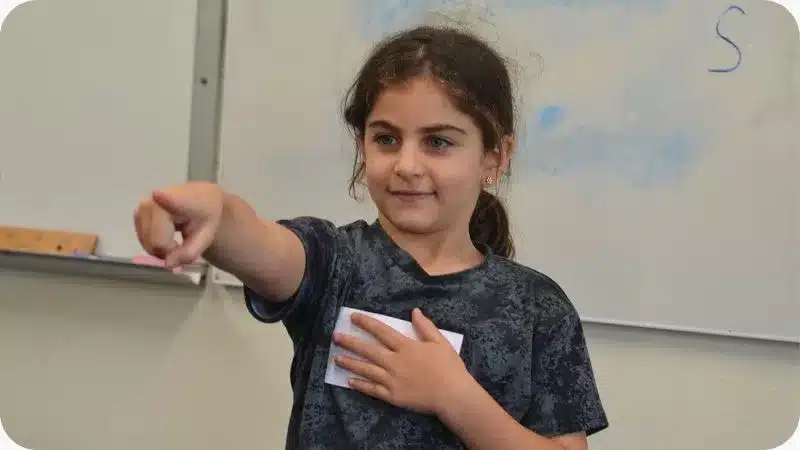
We’ve spoken volumes in other blogs about effective speaking manner – you can check them out here!
That said, you should remember the following:
-
Confident Body Language: Stand tall with an open posture to convey confidence. Use purposeful gestures to emphasise key points and engage the audience.
-
Eye Contact: Make eye contact with different sections of the audience to create a connection and build trust. This helps maintain their attention and shows that you are sincere.
-
Vocal Variety: Use a range of tones and pitches to keep the audience interested. Varying your voice can emphasize important points and convey emotions effectively.
-
Pacing: Maintain a steady pace to ensure clarity. Avoid speaking too quickly, which can cause confusion, or too slowly, which may lose the audience’s interest.
-
Pausing: Use pauses strategically to allow the audience to absorb information and to emphasise critical points. Well-timed pauses can add dramatic effect and enhance understanding.
-
Enthusiasm: Show passion for your topic through your voice and expressions. An enthusiastic delivery can be infectious and motivate your audience to share your opinion.
-
Clear Articulation: Pronounce words clearly and avoid mumbling. Clear articulation ensures that your message is understood by the audience.
-
Engaging Storytelling: Incorporate stories or anecdotes to illustrate your opinions. Engaging storytelling can make your speech more relatable and memorable.
-
Adaptability: Be prepared to adjust your delivery based on audience feedback. If you notice signs of confusion or disengagement, modify your approach to recapture their attention.
-
Practice: Rehearse your speech multiple times to become familiar with the content and delivery. Practice helps build confidence and reduces anxiety during the actual presentation.
By incorporating these techniques, students can deliver persuasive speeches that effectively engage and convince their audience.
Utilising Persuasive Skills
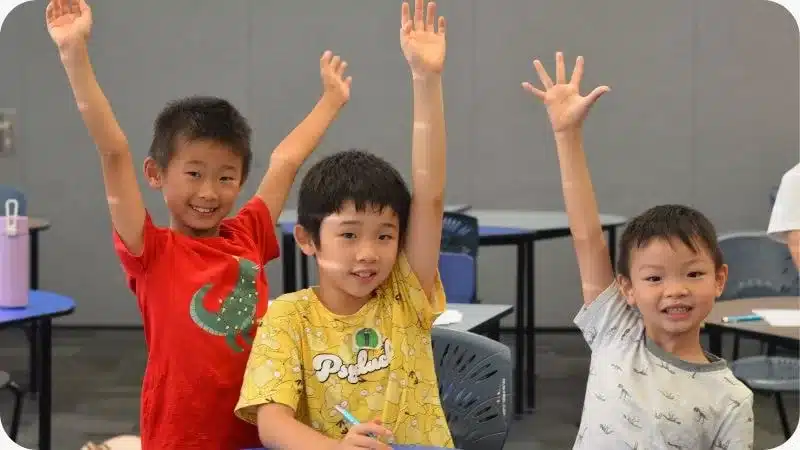
Persuasive speech skills are applicable in various contexts, including school speeches, student elections, and life generally. Fields such as politics, advertising, education, and activism highlight the importance of persuasive speech when the goal is to change someone’s mind. Practising persuasive speeches is crucial, as it benefits individuals in job interviews, business negotiations, and public policy discussions.
Writing persuasive speeches helps achieve success in university, career advancements, and personal life. Mastering persuasive speaking requires time and practice to enhance skills.
Summary
Let’s recap the key concepts covered.
We started by understanding what a persuasive speech is and the importance of convincing the audience. We then delved into the key elements that make a persuasive speech successful, including ethos, pathos, and logos. Choosing the right topic and structuring your speech effectively were highlighted as critical steps.
Delivering your speech with confidence, passion, and engaging storytelling techniques can significantly enhance your persuasive power. Crafting a strong conclusion that reinforces your message and includes a call to action is essential. Enhancing your persuasion skills through practice and application in various contexts will make you a more effective speaker. Now, go forth and persuade with confidence!
Frequently Asked Questions
Who is a speech meant to persuade?
A persuasive speech aims to convince the audience to adopt a specific viewpoint or take action. Whether it’s about voting or environmental initiatives, your words can inspire change!
What is the best persuasive speech topic?
A great persuasive speech topic is one that you’re passionate about. Choosing a relevant and impactful topic that you personally care about can genuinely engage your audience and spark meaningful discussions!
How do I write a persuasive speech?
To write a persuasive speech, focus on clarity and a strong introduction while supporting your points with solid evidence. By knowing your audience and anticipating counter arguments, you can craft a compelling message that resonates deeply.
If the form doesn’t show up correctly below, please follow this link!
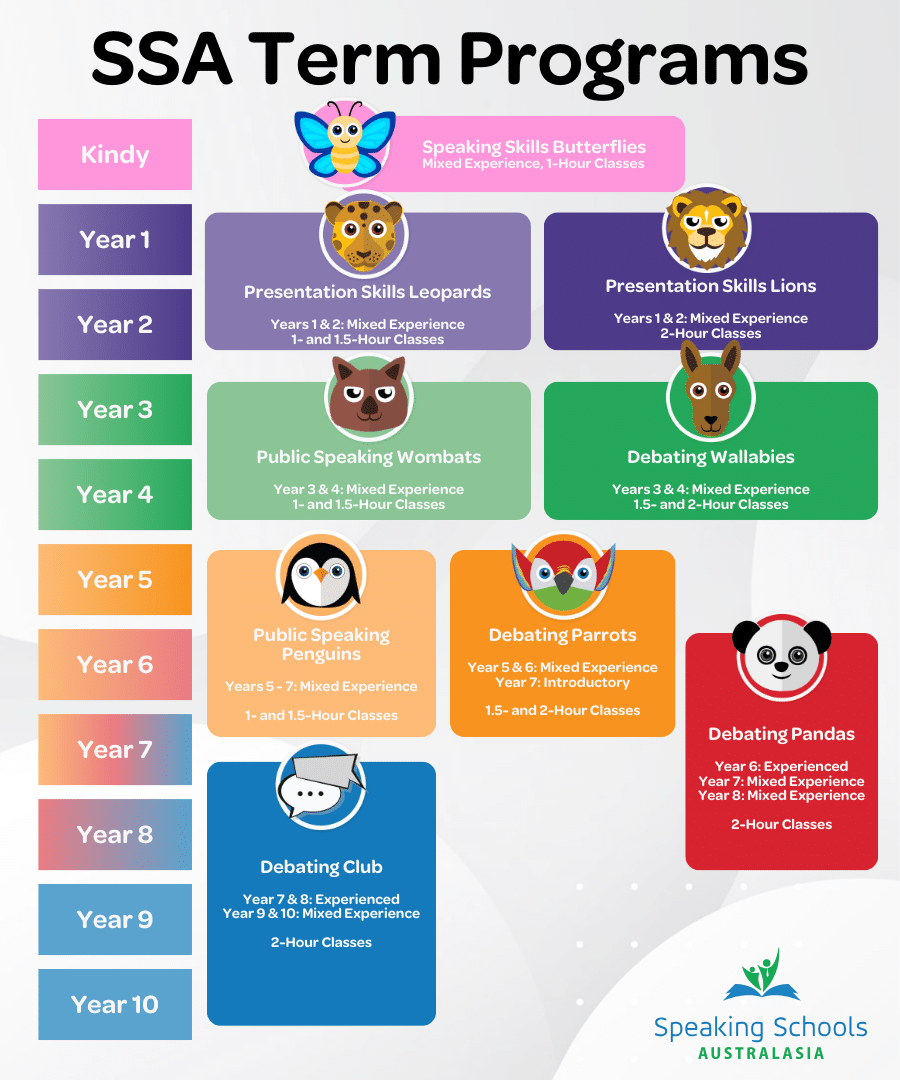
Speaking Schools Australasia is implementing big changes to our public speaking and debating term programs and how they’re structured!
To simplify what we offer, better ensure that all classes can go ahead, provide fresh learning material for students to learn every term and streamline all of our programs, our existing 14 term programs are being reduced down to 9, with modified age groups for all programs above Year 5+.
Notably, it is very important to us that no students are left behind as part of our refresh, and we intend to keep as many options available for as many students as possible. Moreover, the refreshed course content is aimed at placing practice over theory, so students are able to properly apply essential concepts in a range of different activities.
We’ve also introduced similar changes to our holiday workshops, which you can find here.
Please give the below a read to understand the updates for your child’s year group!
My child is in Kindy! What changes can I expect?
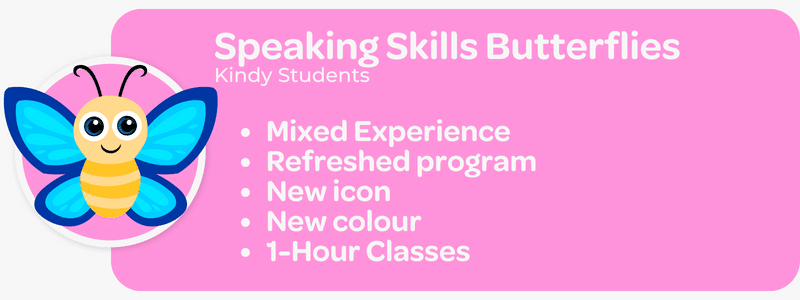
Our Speaking Skills Butterflies will receive a refresh and a facelift, but will otherwise remain the same. The only real difference is a new pink icon and more activities for our youngest students!
My child is in Year 1 or 2! What changes can I expect?
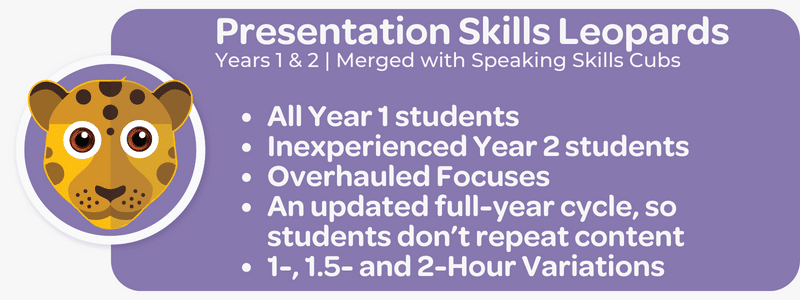

We will be reducing our Year 1 & 2 term programs down to two options.
Firstly, we will be offering our Presentation Skills Leopards program. This mixed-experience program is aimed at all Year 1 students and less experienced Year 2 students (although any Year 2 student is welcome to join). Sessions will run for either 1, 1.5 or 2 hours, depending on the venue (similar to our previous Cubs and Leopards programs).
Secondly, we will be offering our Presentation Skills Lions program. This is also a mixed-experience program, but is instead aimed at all Year 2 students and more experienced Year 1 students. Sessions will similarly run for either 1, 1.5 or 2 hours, depending on the venue (similar to our previous Cubs and Leopards programs). If you’ve got an inexperienced Year 1 student who is considering joining Lions, please get in touch and we can see whether we can accommodate them!
So, what is the difference between the two? Both place a firm commitment on building confidence and using activities to boost student ability. Both also follow a full-year cycle, meaning that students who start Leopards at the beginning of Term #1 in 2024 will not repeat content until they finish Term #4 of Lions in 2025 (before they move on to Public Speaking Wombats or Debating Wallabies).
Finally, what should I do if my child did Speaking Skills Cubs in Term #1, 2024? Unfortunately, we will no longer offer the Cubs program. However, depending on their age group, all existing Cubs students would be able to slip into either Leopards or Lions without any issues!

My child is in Year 3 or 4! What changes can I expect?
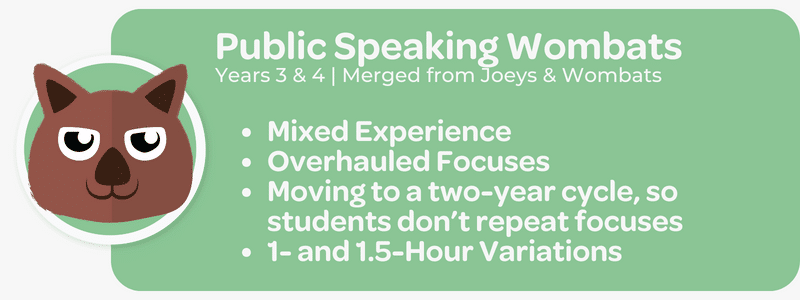
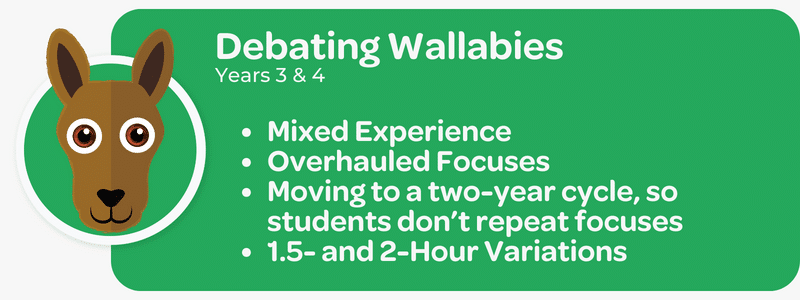
We will be reducing our Year 3 & 4 term programs down to two options.
Firstly, we will be offering our Public Speaking Wombats program. This mixed-experience program, which focuses on various public speaking skills, is aimed at students in Years 3 and 4. Sessions run for either 1 or 1.5 hours, depending on the venue (similar to our old Speaking Skills Joeys program).
Secondly, we will be offering our Debating Wallabies program. This is also a mixed-experience program that instead focuses on ‘value’ and ‘comparative’ style debates, and is aimed at students in Years 3 and 4. Its sessions run for either 1.5 or 2 hours, depending on the venue.
So what is the difference between the two? Aside from a focus on building student confidence and skills, both are also being placed on a two-year cycle, meaning that students who start either program in Term #1, 2024, will not repeat any content before finishing at the end of Year 4 in 2025 (and move onto either Public Speaking Penguins or Debating Parrots).
The main difference between the two is the content that they cover – whilst Wombats covers public speaking, Wallabies takes students through the world of debating. Given that both programs are mixed-experience, students are welcome to also jump between them (or even do both simultaneously) – there will be no penalty for mix and matching.
Finally, what should I do if my child did Speaking Skills Joeys or Debating Wolverines in Term #1, 2024? Unfortunately, neither program will be offered moving forward – we would recommend that:
- Former Joeys students take up either Public Speaking Wombats (which most closely resembles Joeys) or Debating Wallabies, whichever they are more interested in;
- Former Wolverines students get in touch with us or their venue provider to discuss what options are available to ensure that your child can continue their debating journey without issue!


My child is in Year 5! What changes can I expect?
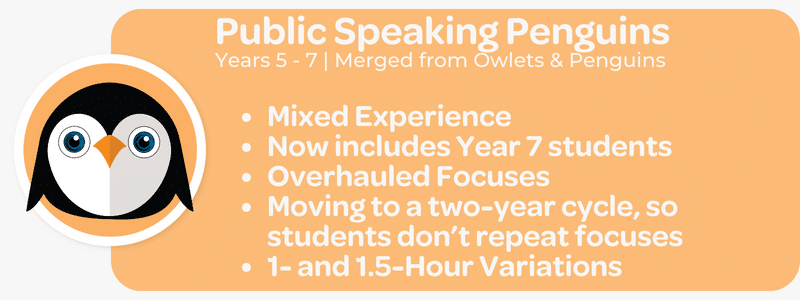

We will be reducing our Year 5 term programs down to two options.
Firstly, we will be offering our Public Speaking Penguins program. This mixed-experience program, which focuses on various public speaking skills (on more advanced topics than those in younger years), is aimed at students in Years 5, 6 and 7. Sessions run for either 1 or 1.5 hours, depending on the venue (similar to our old Speaking Skills Owlets program).
Secondly, we will be offering our Debating Parrots program. This is also a mixed-experience program that instead focuses on ‘policy’ style debates, and is aimed at students in Years 5, 6 and 7. Its sessions run for either 1.5 or 2 hours, depending on the venue.
So what is the difference between the two? Aside from a focus on building student confidence and skills, both are also being placed on a two-year cycle, meaning that repetition of content is very unlikely.
The main difference between the two is the content they cover – whilst Penguins covers public speaking, Parrots takes students through the world of debating. Given that both programs are mixed-experience, students are welcome to also jump between them (or even do both simultaneously) – there will be no penalty for mix and matching.
Finally, what should I do if my child did Speaking Skills Owlets or Debating Pelicans in Term #1, 2024? Unfortunately, neither program will be offered moving forward – we would recommend that:
- Former Owlets students take up either Public Speaking Penguins (which most closely resembles Owlets) or Debating Parrots, whichever they are more interested in;
- Former Pelicans students get in touch with us or their venue provider to discuss what options are available to ensure that your child can continue their debating journey without issue!


My child is in Year 6! What changes can I expect?


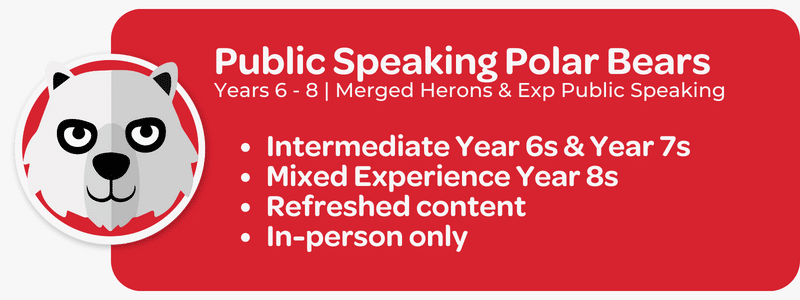
We will be reducing our Year 6 term programs down to three options.
Firstly, we will be offering our Public Speaking Penguins program. This mixed-experience program, which focuses on various public speaking skills, is aimed at students in Years 5, 6 and 7. Sessions run for either 1 or 1.5 hours, depending on the venue (similar to our old Speaking Skills Owlets program).
Secondly, we will be offering our Debating Parrots program. This is also a mixed-experience program that instead focuses on ‘policy’ style debates, and is aimed at students in Years 5, 6 and 7. Its sessions run for either 1.5 or 2 hours, depending on the venue.
Thirdly, we will be offering our Debating Pandas program. This is meant for advanced Year 6s, intermediate Year 7s and mixed-experience Year 8s – if your child is in Year 6, we would recommend only moving up from Debating Parrots to Debating Pandas if they’re sufficiently advanced (and ideally have been recommended to do so by their coach).
So, what is the difference between the three? Aside from focusing on building student confidence and skills, all are also being placed on a two-year cycle, meaning that repetition of content is very unlikely. Debating Pandas, in particular, is ‘semi-modular’ in nature, so the content will be different depending on the class each term.
The main difference between the two mixed-experience programs is the content they cover – Penguins covers public speaking, Parrots takes students through the world of debating. Given that both programs are mixed-experience, students are welcome to also jump between them (or even do both simultaneously) – there will be no penalty for mix and matching.
Alternatively, Debating Pandas is only recommended for Year 6 students who have demonstrated their debating ability, as there will be less scaffolded content and higher-level debates against older students.
Finally, what should I do if my child did Speaking Skills Owlets or Debating Pelicans in Term #1, 2024? Unfortunately, neither program will be offered moving forward – we would recommend that:
- Former Owlets students take up either Public Speaking Penguins (which most closely resembles Owlets) or Debating Parrots, whichever they are more interested in;
- Former Pelicans students get in touch with us or their venue provider to discuss what options are available to ensure that your child can continue their debating journey without issue!


My child is in Year 7! What changes can I expect?



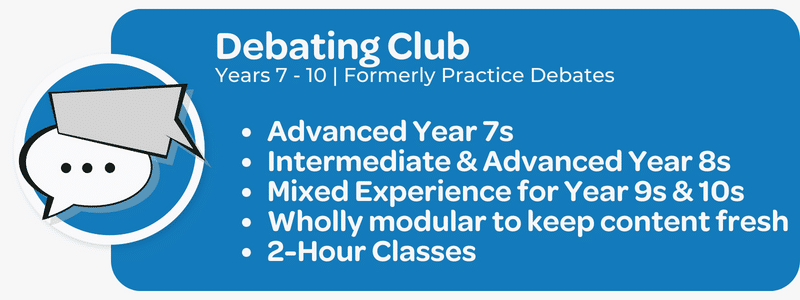
We will be increasing our Year 7 term programs up to four options.
Firstly, we will be offering our Public Speaking Penguins program. This mixed-experience program, which has been expanded to include Year 7 students and focuses on various public speaking skills, is aimed at students in Years 5, 6, and 7. Sessions run for either 1 or 1.5 hours, depending on the venue (similar to our old Speaking Skills Owlets program).
Secondly, we will be offering our Debating Parrots program. This is also a mixed-experience program that instead focuses on ‘policy’ style debates, and is similarly aimed at students in Years 5, 6 and 7. Its sessions run for either 1.5 or 2 hours, depending on the venue.
Thirdly, we will be offering our 2-hour Debating Pandas program. This is meant for advanced Year 6s, intermediate Year 7s and mixed-experience Year 8s – if your child is in Year 7, we would recommend only moving up from Debating Parrots to Debating Pandas if they’ve got the essentials downpat (and ideally have been recommended to do so by their coach).
Fourthly and finally, we will be offering our 2-hour Debating Club program. Formerly known as Practice Debates, this program is for more experienced students and is only recommended for advanced Year 7 students. It is completely modular in nature (so no two programs are ever the same) and assumes all students have debating experience.
So, what is the difference between the four? Aside from focusing on building student confidence and skills, both are on a two-year cycle or are modular in nature, meaning that repetition of content is very unlikely.
The main difference between the two mixed-experience programs is the content they cover – Penguins covers public speaking, Parrots takes students through the world of debating. Given that both programs are mixed-experience, students are welcome to also jump between them (or even do both simultaneously) – there will be no penalty for mix and matching.
Alternatively, Debating Pandas is only recommended for intermediate Year 7 students who have demonstrated their debating ability, as there will be less scaffolded content and higher-level debates against older students. Debating Club is then for advanced Year 7 students who have demonstrated strong debating ability, and would be able to match up to students much further into high school.
My child is in Year 8! What changes can I expect?


We will be maintaining our Year 8 term programs at two options.
Firstly, we will be offering our 2-hour Debating Pandas program. This is meant for advanced Year 6s, intermediate Year 7s and mixed-experience Year 8s – if your child is in Year 8, we would recommend that they give our Debating Pandas a try only if they’re reasonably comfortable in front of an audience.
Secondly, we will be offering our 2-hour Debating Club program. Formerly known as Practice Debates, this program is for more experienced students and is only recommended for intermediate Year 8 students who have prior experience (either through SSA or their school). It is completely modular in nature (so no two programs are ever the same) and assumes all students have debating experience.
What should you do if you have an inexperienced child in Year 8? We would recommend that they still give our Debating Pandas program a try – coaches go over the essentials at the beginning of the program to ensure a level playing field. However, should this not work for you, you’re welcome to get in touch and we can discuss whether Public Speaking Penguins or Debating Parrots might be a better fit for your child.
Please note that Debating Club is not recommended for inexperienced Year 8 students.
My child is in Year 9 or 10! What changes can I expect?

We will reduce our Year 9 term programs to one option and no longer offer an introductory program for Year 9 students.
The sole program for Years 9 & 10 will be our 2-hour Debating Club program. Formerly known as Practice Debates, this program is for more experienced students and is only recommended for intermediate-level Year 8 students who have prior experience (either through SSA or their school). It is completely modular in nature (so no two programs are ever the same) and assumes all students have debating experience.
What should you do if you have an inexperienced child in Year 9? We would recommend that they still give Practice Debates a try – coaches go over the essentials at the beginning of the program to ensure a level playing field. However, should your child be on the shier side, they may be better served with one of our holiday workshops.
Navigating the delicate intricacies of feminist discourse is no small feat. Inside and outside of the classroom, debates surrounding gender equality can spark deep, meaningful dialogue or erupt into contentious battles of ideologies.
To those at the starting line of their debate careers, particularly in high school where belief systems are being shaped and hardened, understanding the various elements of feminism can be daunting, regardless of one’s gender.
Read on to learn more about how feminism debates can be tackled in high school competitions!
The Pursuit of Equity Over Equality
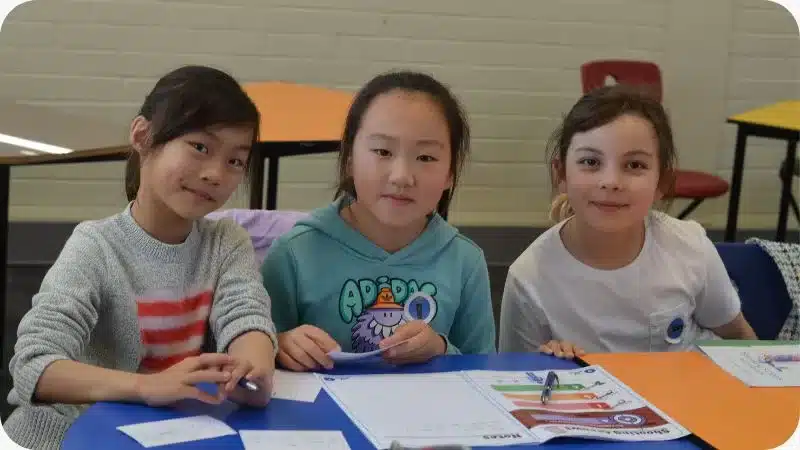
Debates on feminism must transcend the mere principle of equality.
In our world, equality itself isn’t enough – striving for equity becomes the true north, for it envisages a state where everyone experiences the justice they deserve, tailored to individual needs.
This philosophy lies at the intersection of formal equality— where the same rules and resources are uniformly applied to all — and substantive equity, which focuses on customised fairness that could rectify historical and social imbalances.
In practical terms, equity-oriented feminism is about creating systems that address past discrimination and value diversity.
When students engage in such dialogues, they should aspire to foster environments where all genders, not just cis women, can thrive. This approach empowers debaters to make nuanced arguments that acknowledge individual experiences and the intersectionality of gender with race, socioeconomic status, and other facets of identity.
The Spectrum of Feminist Ideology
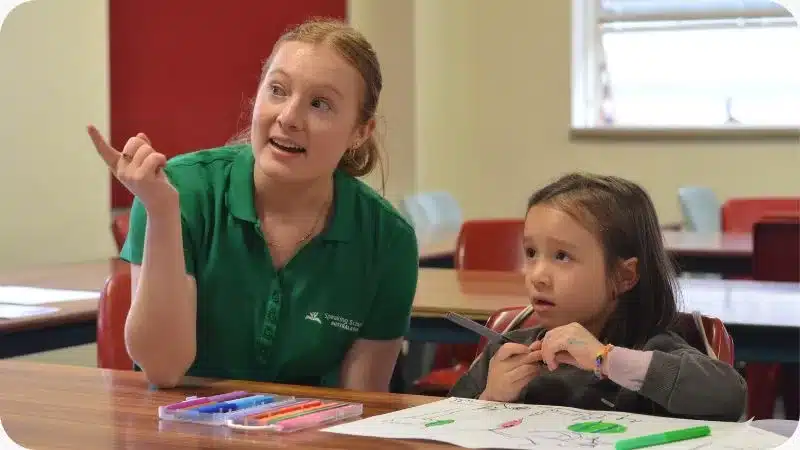
Within feminist discourse, a perpetual debate simmers between broad and narrow definitions of the movement.
Broad feminists advocate for an inclusive platform encompassing a wide array of issues and perspectives, recognising that a diverse movement can yield rich, multifaceted solutions.
On the other hand, narrow feminists propose a more focused agenda, cautioning against the dilution of core objectives through expansive inclusivity.
In pursuing victory, debaters must carefully distinguish where their topic falls on the spectrum. For example, on the topic That the feminist movement should actively encourage male leaders, the Affirmative is aiming at a broad feminist movement, whilst the negative is restricting its leadership to a smaller population. Arguing for either breadth or specificity requires a strategic approach.
For instance, defending a broad feminist stance might involve championing comprehensive policies that accommodate a variety of experiences and challenges commonly faced by women, or the inclusion of men within the feminist movement. Conversely, advocating for a narrow feminism can allow for concentrated efforts and, in their subsequent success, a ripple effect that benefits all women.
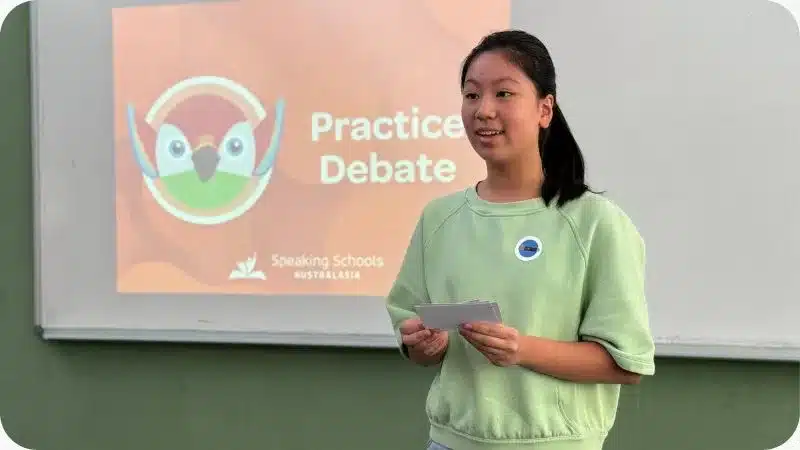
So what are the common arguments involved?
When arguing for broad feminism, you may want to look at the following:
- The ‘marketplace of ideas’ argument – essentially, the more views and perspectives are discussed, the more likely the best ideas will rise to the top and be adopted.
- It allows for a more nuanced understanding of how the movement works – women can agree on some things (e.g. equal pay), whilst disagreeing on others (e.g. pro-life stances, quotas). By allowing all women from different walks of life a seat at the table, you’re likely to hear a greater number of perspectives – given the overarching goal of feminism is to maximise the individual choices of all women, this is a net good in itself.
- A larger movement means greater advocacy, as it has more champions. It also leads to less animosity, as the movement has not shunned other individuals, meaning there is less opposition overall.
On the other hand, if you’re arguing for narrow feminism, you may want to consider the following:
- A broad house splinters the ideas and goals that feminism is seeking to achieve, meaning that we don’t end up achieving any of them – political capital is limited, and trying to persuade the government to do too many things simultaneously means that nothing is achieved.
- Including a larger number of individuals (e.g. rich white women) almost always means that you’re including some who won’t necessarily require the same protection from the movement. This dilutes the movement’s goals, and trade-offs between the different sub-groups mean the important things get pushed to the side.
- A more singular vision makes it much easier to coordinate and lobby governments and/or decision-makers, leading to a greater number of goals being achieved.
Importantly, the debate between narrow and broad feminism within high school competitions is not just an academic exercise but a reflection of the broader discourse occurring in society today. Both perspectives offer valid points that merit consideration – which is what debating is all about.
Common Clashes in Feminism Debates
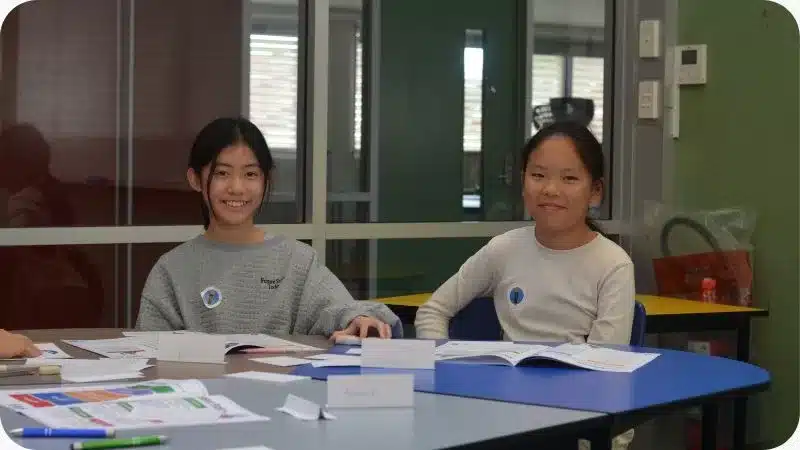
When considering feminism and gender debates, there usually are three broad clashes where the affirmative and negative will have conflicting views:
- What are the movement’s goals and what are we trying to achieve for women?
- Does this policy help them achieve these goals?
- What impact will this have on the movement as a whole?
Depending on the debate, these clashes may take many different forms – and in some debates, there won’t be any conflict over one or more of these clashes.
As with any debate, there’s no way to be sure what the other side will raise before you get into the room, so make sure that you apply the clashes that actually occur within the debate!
Going Against Feminism?
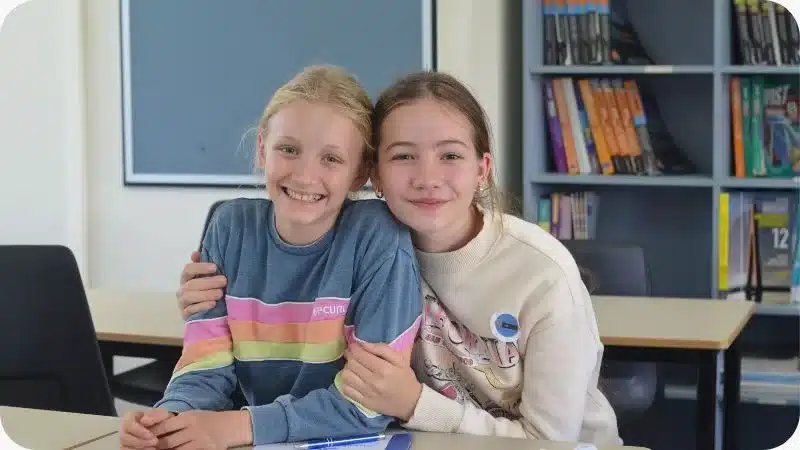
In virtually every debate, it is unwise to go against feminism – it is generally accepted (as it should be) that obtaining equity for women and gender minorities is a good thing. It is almost never a good strategic (or moral) decision to seek to abolish feminism in a debate. If you read a topic, and feel you’re on the ‘anti-feminism’ side, you’ve probably not read the topic properly.
So, do the concepts in the topic help or hinder the feminist cause? What should you do when a topic suggests that you should oppose what appears to be a good idea that might just help? D
When on the negative in these types of debates, it is generally wise to either propose a countermodel (making sure that it is mutually exclusive and properly explained!) or demonstrate why things are progressing well under the status quo.
If you go with the latter, there are lots of examples that you can refer to – for example:
- Sport – The Women’s World Cup was held in Australia last year, and was the biggest Women’s sporting event ever, with over 1.7 million tickets sold (and more people tuning into the opening match than the Men’s Ashes). This has continued since the World Cup, with all Australia-based Matilda’s games sold out. There is also a movement towards equal winnings from the 2027 Football World Cup.
- Politics – All state and territory governments have had a female Premier (except SA), and around 50% of both the Federal and NSW Governments are women.
- Legal – Until recently, the majority of the High Court of Australia (our highest court) was made up of female Justices, including Chief Justice Kiefel (since her retirement, it is now 3 of 7).
- Business – We’ve recently welcomed the first female RBA Governor (Michelle Bullock) and QANTAS CEO (Vanessa Hudson). Women’s participation rate in the economy has increased (74% in 2021, compared to 50% in 1980 and presently 82% for men). The number of Fortune 500 companies with a female CEO has increased from 20 to 50 in the past 10 years (150% increase). The gender pay gap has reduced by nearly 24% in the past decade (28.6% to 21.7%).
- Socially – There has been a massive rise in awareness of female issues, e.g. Rosie Batty, Grace Tame, Britney Higgins, #metoo movement, increased number high profile sexual assault prosecutions
Keep in mind that, if you’re going with the status quo, the most important thing is to establish that we’re heading in the right direction (not that we’ve solved all the issues facing women and gender minorities) and that further intervention may harm this trajectory – it isn’t enough to just do the former!
Common Gender Topics from Debating Competitions
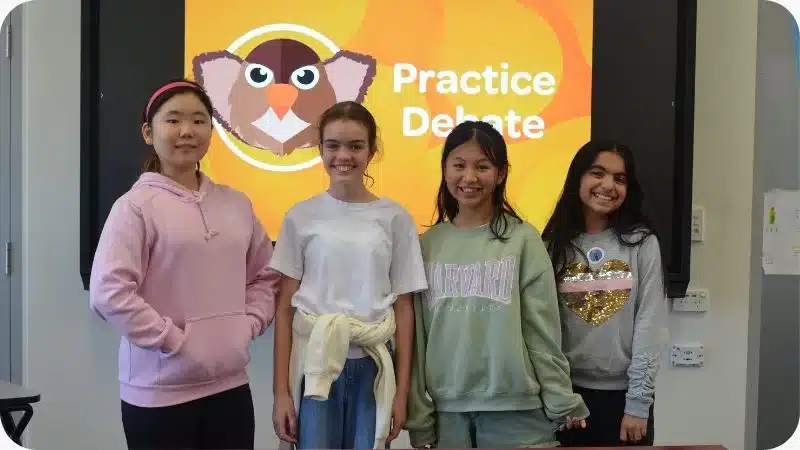
With the above in mind, it’s finally worth exploring some topics, most of which have previously come up in debating competitions – we’ve compiled a list of 25+ below!
If you have some spare time, consider whether each asks for a narrow or broad interpretation of feminism, what clashes might come up in each, and how you might justify the status quo (or propose a countermodel) as the negative side.
We’ve grouped similar topics together, so you can see iterations on similar concepts!
- That we should ban movies without major female characters
- That we should ban video games without playable female characters
- That we should introduce a quota for female characters in children’s books and television shows
- That films that do not meet the Bechdel Test should be denied classification
- That we should ban the advertising of makeup and beauty products
- That women should pay lower rates of tax than men
- That we should offer tax cuts for companies with female executives.
- That parents should not be allowed to choose the gender of an adoptive child
- That airbrushing in fashion magazines should be banned
- That we should ban beauty contests for children under 18
- That children’s sports should have mixed-gender teams instead of separate boy and girl teams
- That broadcasters should be forced to show equal amounts of men’s and women’s sport
- That we should ban out-of-court settlements in sexual harassment and discrimination cases
- That the government should provide incentives to female artists
- That seats in Parliament should be reserved for women
- That there should be a quota of women on corporate boards
- That the feminist movement should actively include male leaders
- That the feminist movement should actively seek to exclude conservative voices
- That feminists in the developing world should seek to distance themselves from Western feminism
- That we should tie development aid to the women’s rights record of recipient countries
- That capitalism does more harm than good for feminism
- That, as a feminist parent, we would choose to send our daughter to a single-sex school
- That film companies should produce remakes that replace traditionally male characters with female ones (e.g. ‘Jane Bond,’ the all-female Ghostbusters etc)
- That we prefer global feminist movements to local ones
- That we should remove gender from all official documents and forms
- That we should abolish gendered categories in awards ceremonies (e.g. Best Actor and Actress replaced by Best Performance)
- That we make prenuptial agreements mandatory
- That feminists should actively advocate for men working in traditional female industries (e.g. teaching, childcare, nursing etc)
Concluding Thoughts
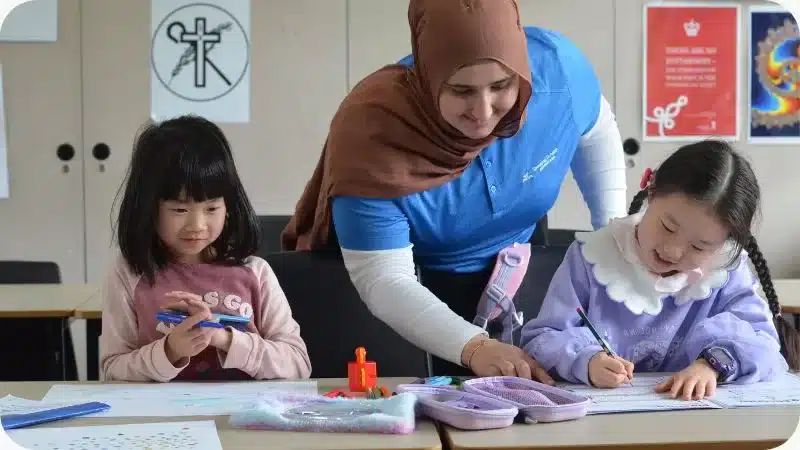
Navigating the intricacies of feminist debates is an invaluable skill for high school students, not only because it comes up almost every year in debating competitions, but because it’s also important for life more generally.
By understanding the nuanced distinction between formal equality and equitable outcomes, recognising the spectrum of feminist ideology, and developing comprehensive strategies for success, young debaters can engage in this vital discourse with clarity and impact.
There are so many more topics you can cover in feminism – from feminist waves to intersectionality to choice feminism – but we unfortunately don’t just don’t have room in this blog, so watch this space!
The path to winning feminism debates is paved with rigorous preparation, steadfast empathy, and an enduring commitment to gender equity.

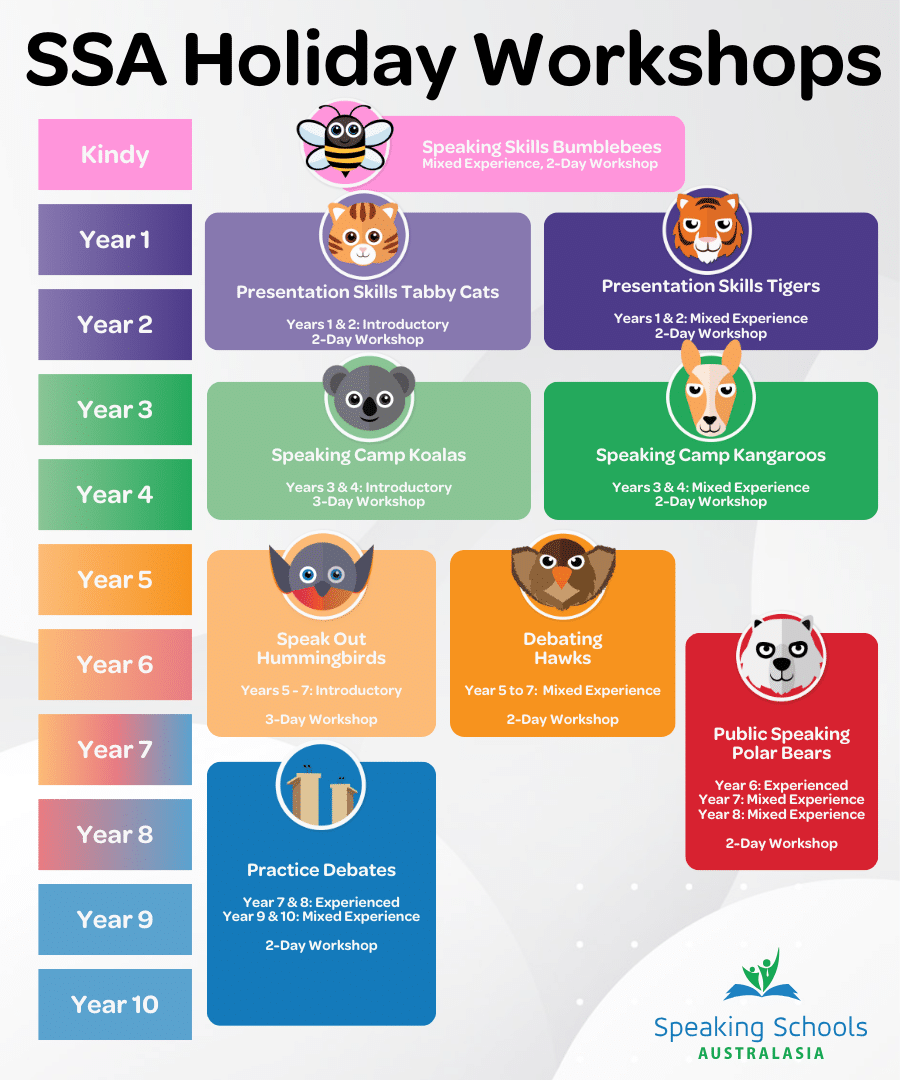
Speaking Schools Australasia has made some big changes as to how we organise our public speaking and debating holiday workshops!
To simplify what’s on offer, ensure that students always have fresh material to learn and to streamline a ground-up refresh of all our workshops, we’ve condensed our offerings from 13 programs down to 9, and modified the age groups for all programs Year 5 and above.
Notably, at the core of this refresh is ensuring that no student gets left behind, that there are appropriate options available for different experience levels and that all of our workshops will be even better than before. All content refresh will be targeted at prioritising practice over theory, so students not only learn the most important content, but have plenty of opportunities to practice it as well.
We’ll also introduce similar changes for Term #2, so please watch this space.
Please give this blog a read to understand the changes for your student’s year group!
My child is in Kindy! What changes can I expect?
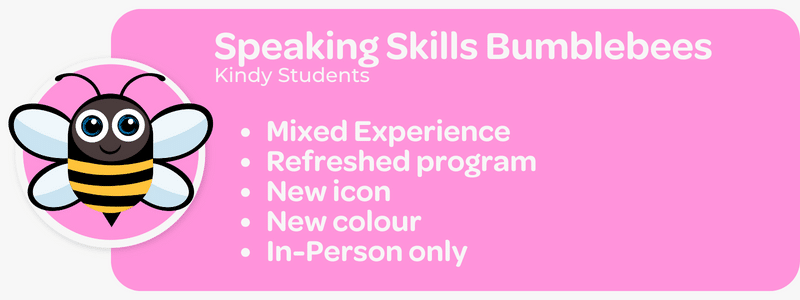
Whilst our Speaking Skills Bumblebees will receive a refresh and a facelift, it will more or less remain the same – just now with a pink icon and more activities for our youngest students!
My child is in Year 1 or 2! What changes can I expect?
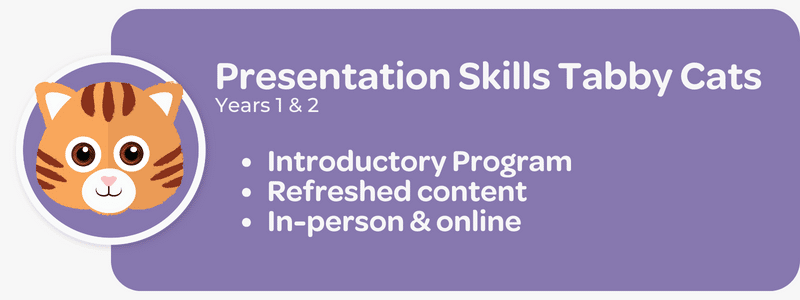
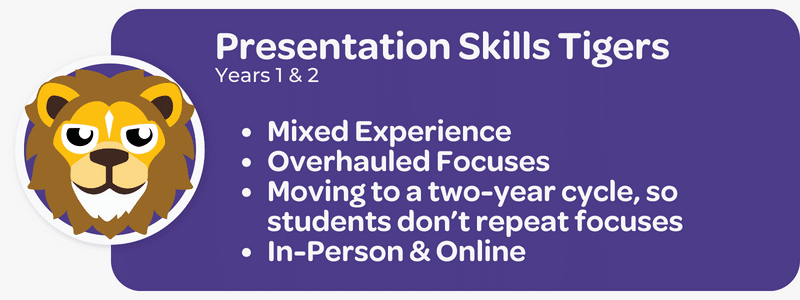
Our introductory holiday workshop, Presentation Skills Tabby Cats, will be receiving a content refresh to ensure it’s up to date with modern public speaking and teaching practices, but will otherwise be staying as it is. It is now being branded as an ‘Introductory Workshop’, which means it is the best workshop for students to do once they hit Year 1 or 2, even if they’ve previously completed our Speaking Skills Bumblebees or Butterflies programs.
As an Introductory Workshop, Presentation Skills Tabby Cats is only intended to be completed once, before students move on to Presentation Skills Tigers (which changes every holiday).
Our mixed experience holiday workshop, Presentation Skills Tigers, will be receiving a range of new focuses that distinguish it from our other programs, and mean that a Year 1 student who started in January 2024 will not repeat any content even if they were to do the program every holiday up to October 2025 (before they move onto Speaking Camp Koalas or Speaking Camp Kangaroos).
My child is in Year 3 or 4! What changes can I expect?
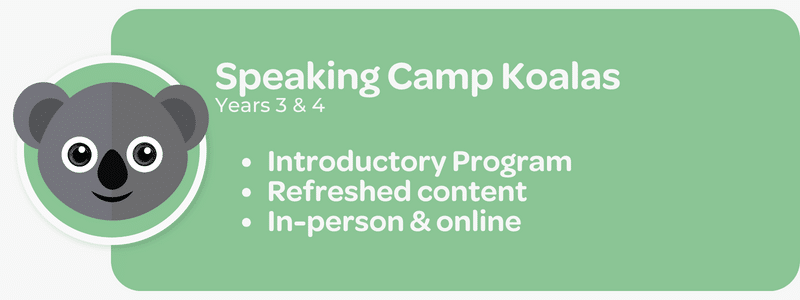
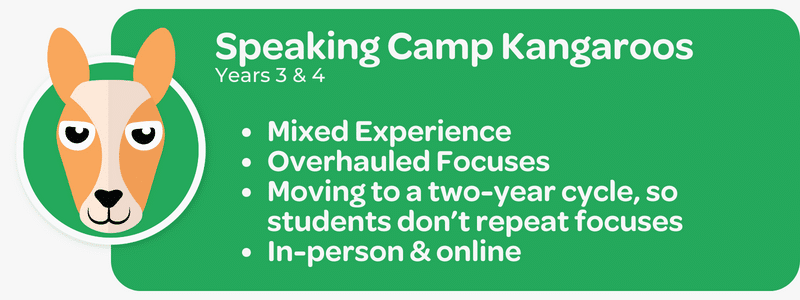
Our introductory holiday workshop, Speaking Camp Koalas, will be receiving a content refresh to ensure it’s up to date with modern public speaking and teaching practices, but will otherwise be staying as it is. It is now being branded as an ‘Introductory Workshop’, which means it is the best workshop for students to do once they hit Year 3 or 4, even if they’ve previously completed any of our younger term (e.g. Leopards or Lions) or holiday (e.g. Tabby Cats or Tigers) programs.
As an Introductory Workshop, Speaking Camp Koalas is only intended to be completed once, before students move on to Speaking Camp Kangaroos (which changes every holiday).
Our mixed experience holiday workshop, Speaking Camp Kangaroos, will be receiving a range of new focuses that distinguish it from our other programs, and mean that a Year 3 student who started in January 2024 will not repeat any content even if they were to do the program every holiday up to October 2025 (before they move onto our Speak Out Hummingbirds workshop).
My child is in Year 5! What changes can I expect?
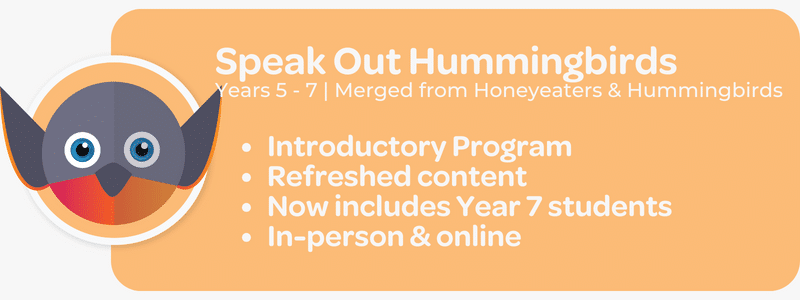
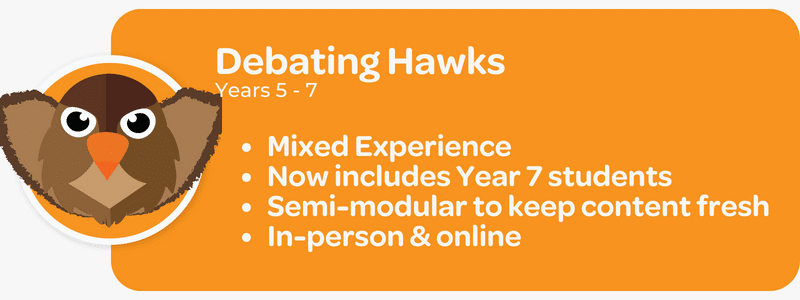
There are three main changes for students in Year 5.
Firstly, we will be merging our two beginner-level workshops (Public Speaking Honeyeaters and Debating Hummingbirds) into a single program – Speak Out Hummingbirds – which will introduce students to both public speaking and debating. This is aimed at exposing students to both disciplines, so they can get a feel for both and determine which one they enjoy more.
Secondly, our Debating Hawks workshop (which was previously for experienced Year 5 & 6 students) is being refreshed as an intermediate-level program that is aimed at primary school (or early high school) students who have some debating experience but still have more to learn. This will be perfect for students who have either completed our Hummingbirds workshop or those who are doing our Debating Parrots program during the term.
Thirdly, the old experienced Public Speaking Herons program is being merged with the high school Experienced Public Speaking program to make the Public Speaking Polar Bears workshop (see below), and so will no longer be offered to students in Year 5. However, should your Year 5 child be particularly interested in public speaking, please get in touch and we will see whether we can accommodate them.


My child is in Year 6! What changes can I expect?



There are three main changes for students in Year 6.
Firstly, we will be merging our two beginner-level workshops (Public Speaking Honeyeaters and Debating Hummingbirds) into a single program – Speak Out Hummingbirds – which will introduce students to both public speaking and debating. This is aimed at exposing students to both disciplines, so they can get a feel for both and determine which one they enjoy more.
Secondly, our Debating Hawks workshop (which was previously for experienced Year 5 & 6 students) is being refreshed as an intermediate-level program that is aimed at primary school (or early high school) students who have some debating experience but still have more to learn. This will be perfect for students who have either completed our Hummingbirds workshop or those who are doing our Debating Parrots program during the term.
Thirdly, the old experienced Public Speaking Herons program is being merged with the high school Experienced Public Speaking program to create the intermediate-level Public Speaking Polar Bears workshop. This will provide excellent public speaking opportunities for students with some experience in Years 6, 7, or 8.


My child is in Year 7! What changes can I expect?



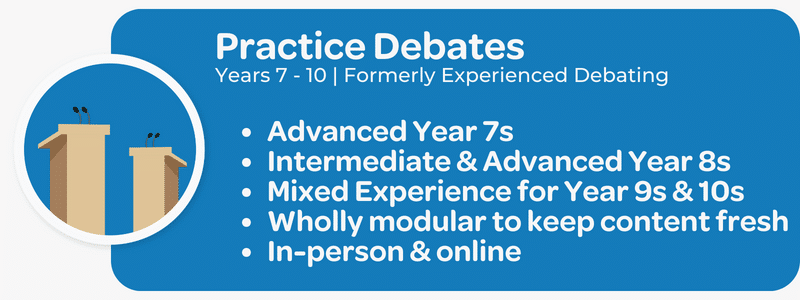
There are three main changes for students in Year 7.
Firstly, we will be merging our two beginner-level workshops (Public Speaking Honeyeaters and Debating Hummingbirds) into a single program – Speak Out Hummingbirds – which will introduce students to both public speaking and debating. This is aimed at exposing students to both disciplines, so they can get a feel for both and determine which one they enjoy more.
Secondly, our old Experienced Public Speaking program is being merged with Public Speaking Herons to make the intermediate-level Public Speaking Polar Bears workshop, which will provide excellent public speaking opportunities for students with some experience who are in Years 6, 7 or 8.
Thirdly, there will now be two options available for debaters who already have some experience:
- Our intermediate Debating Hawks workshop has been expanded to include Year 7 students who have some debating experience, but don’t quite feel ready (or haven’t been recommended) for our more advanced Practice Debates program;
- Our advanced Practice Debates program (formerly Experienced Debating) has been expanded to include Year 10, and is meant for advanced Year 7 students who are able to go toe-to-toe with older students in a debating context.
If you’re not sure which would be best for your child, please let us know, and we’d be more than happy to discuss it!



My child is in Year 8! What changes can I expect?


There are three main changes for students in Year 8.
Firstly, we will no longer offer an introductory program (such as Foundations of Debating or Foundations of Public Speaking) for Year 8 students, and instead invite them to give one of our other workshops a go (see below).
Secondly, our old Experienced Public Speaking program is being merged with Public Speaking Herons to make the Public Speaking Polar Bears workshop, which will provide excellent public speaking opportunities for students with some experience who are in Years 6, 7 or 8.
Thirdly, our old Experienced Debating program has been refreshed as Practice Debates, will now accommodate Year 10 students, and more intermediate-level Year 7 students will be invited to join Debating Hawks. This means the program should now have a higher average ability level, making it more challenging for older students.
What should you do if you have an inexperienced child in Year 8? We would recommend that they still give our Public Speaking Polar Bears program a try – coaches go over the essentials at the beginning of the program to ensure a level playing field. However, should this not work for you, you’re welcome to get in touch and we can discuss whether Speak Out Hummingbirds or Debating Hawks might be a better fit for your child. Please note that Practice Debates is not recommended for inexperienced Year 8 students.



My child is in Year 9! What changes can I expect?

Firstly, we will no longer offer an introductory program (such as Foundations of Debating or Foundations of Public Speaking) for Year 9 students, and instead invite them to give one of our other workshops a go (see below).
Secondly, our old Experienced Public Speaking program is being merged with the experienced Public Speaking Herons program to make the Public Speaking Polar Bears workshop, designed for students up to Year 8. Should your child in Year 9 be keen to join this workshop, please get in touch and we’ll do our best to accommodate you.
Thirdly, our old Experienced Debating program has been refreshed as Practice Debates, and will now accommodate Year 10 students, and more intermediate-level Year 7 students will be invited to join Debating Hawks. This means the program should now have a higher average ability level, making it more challenging for older students.
What should you do if you have an inexperienced child in Year 9? We would recommend that they still give Practice Debates a try – coaches go over the essentials at the beginning of the program to ensure a level playing field. However, should your child be on the shier side, they may be better served in our Public Speaking Polar Bears workshop – please get in touch and we can discuss your personal circumstances!



My child is in Year 10! What changes can I expect?

The is only one big change for Year 10, and that is we’ve now got a workshop that can accommodate them!
Our Experienced Debating program has been refreshed as Practice Debates, will now accommodate Year 10 students, and more intermediate-level Year 7 students will be invited to join Debating Hawks. This means the program should now have a higher average ability level, making it more challenging for older students.
Over the past two months, students at SSA have been hard at work preparing, practising and presenting their speeches for the our third public speaking competition, the Rising Voices Public Speaking Championship.
Last weekend saw the culmination of the Championship, with 24 participants vying for a trophy across four age divisions.
This year, the theme of the competition was ‘Empowerment’, where all speakers were asked to devise and deliver a speech on a topic that relates to this theme. Each age group had five topics they could choose from, ranging from ‘How can I be a leader’ for Stage #1 students to ‘Equal opportunity = equal respect’ for Stage #4 students.
Our three judges – Luisa, Cassidy and Rani – had a huge task determining only four champions across the four divisions. Despite having an incredibly tough time deciding between all the exceptional presentations – which took twice as long as we had scheduled, given the difficulty of the decision – they eventually emerged with four champions:
- Stage #1 – Ashlyn
- Stage #2 – Samouel
- Stage #3 – Mar
- Stage #4 – Rohan
We extend our heartfelt gratitude to all those who joined us in showing support for these remarkable young speakers.
Finally, a big congratulations to all the winners and finalists – we feel empowered by the remarkable skill, effort and charisma you showed throughout the competition!
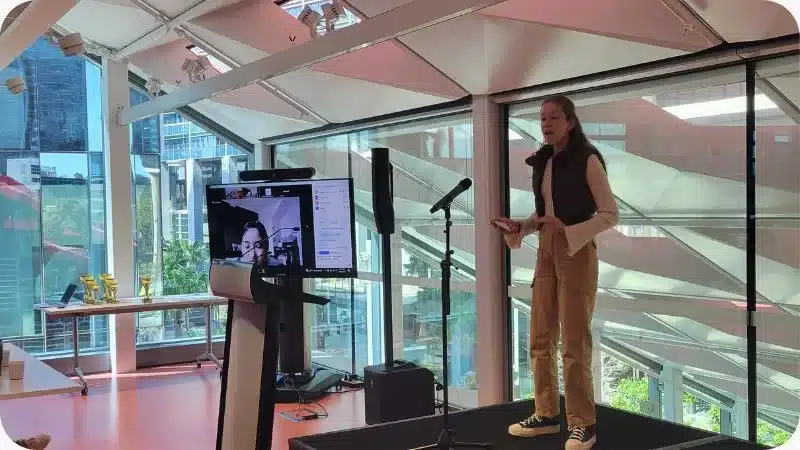
What is the Rising Voices Championship?
The Rising Voices Public Speaking Championship is an exciting competition that encourages students to hone their speaking skills and share their ideas with others.
Building off previous iterations of the SSA Cup in 2022 and the Sydney Speaking Competition in 2021, this year’s theme was “Empowerment,” providing contestants with a chance to discover how their voices can make a positive impact on themselves and those around them.
The competition was divided into four divisions: Stage #1 (Years 1 & 2), Stage #2 (Years 3 & 4), Stage #3 (Years 5 & 6) and Stage #4 (Years 7 – 9), each with a different set of topics that they could choose from.
All participants were judged on three primary criteria: manner (body language, eye contact, vocal variety and overall delivery), matter (the content of their speech) and method (speech structure).
Stage #3 and Stage #4 students were also judged in an Impromptu Category, in which they were given 5 minutes to prepare a speech on the topics “Courage” and “Kindness” respectively.
While there can only be three champions in each division, every participant delivered remarkable speeches that truly stood out. Keep reading to discover the complete lists of finalists and winners from this year’s competition!
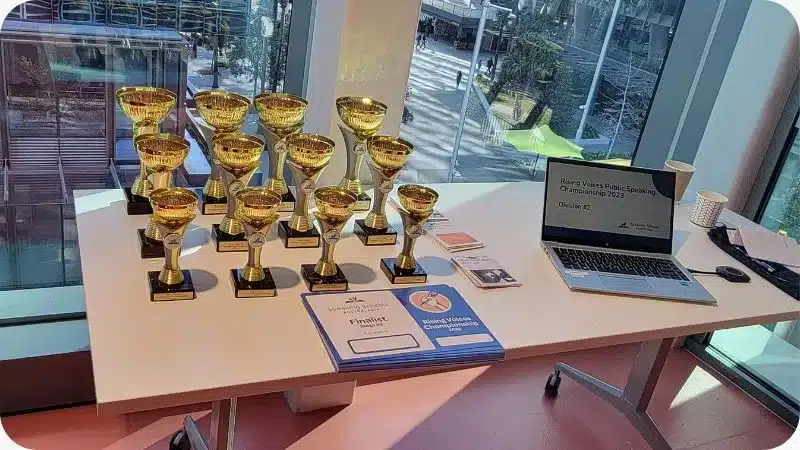
The Empowering Qualities of Public Speaking
Public speaking is an important skill that empowers students in a variety of ways.
Firstly, it helps students develop confidence and self-esteem. By speaking in front of an audience, students are forced to confront their fears and overcome them. This makes them more confident and self-assured in their day-to-day lives, empowering them to seek out positive changes they can make in the world.
Secondly, public speaking is a great way to improve critical and creative thinking skills. When students are given a topic to speak about, they are forced to research and think critically in order to develop a compelling argument. This not only improves their critical thinking abilities, but also their creativity. By presenting new and innovative ideas to an audience, students are empowered to think outside the box and come up with creative solutions to problems.
Finally, public speaking is an important tool for leadership development. Effective leaders are able to communicate their vision and inspire their teams. Public speaking provides an opportunity for students to develop these leadership skills by presenting their ideas to a group of people. By learning how to engage and persuade an audience, students are empowered to become future leaders in their communities and careers.
Finalists & Winners at Rising Voices 2023
Division #1 (Years 1 & 2)
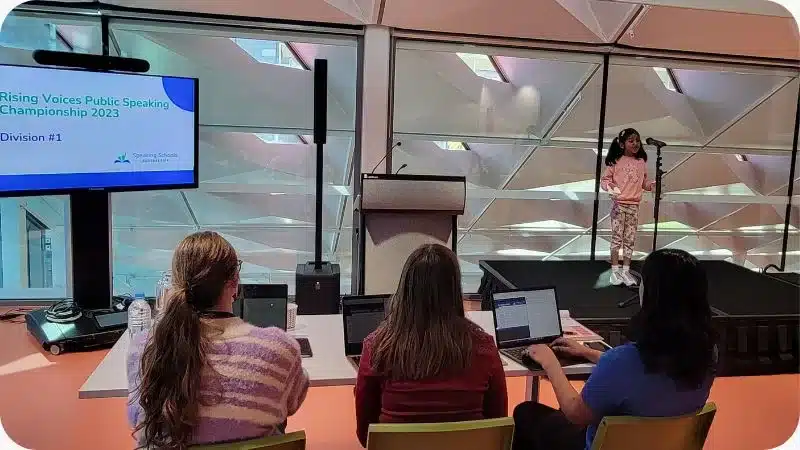
Congratulations to the six finalists selected for the Stage #1 Division of the Rising Voices Championship 2023!
Ashlyn – First Place
William – Second Place
Ridhi – Third Place
Jasper – Special Award
Chloe – Finalist
Pia – Finalist
Division #2 (Years 3 & 4)

Our heartfelt congratulations to the six finalists chosen for the Stage #2 Division of the Rising Voices Championship 2023!
Samouel – First Place
William – Second Place
Hugo – Third Place
Brian – Special Award
Joanna – Finalist
Rocky – Finalist
A particular congratulations to Samouel, who was also the first-placed participant in the Stage #2 division of the SSA Cup in 2022!
Division #3 (Years 5 & 6)
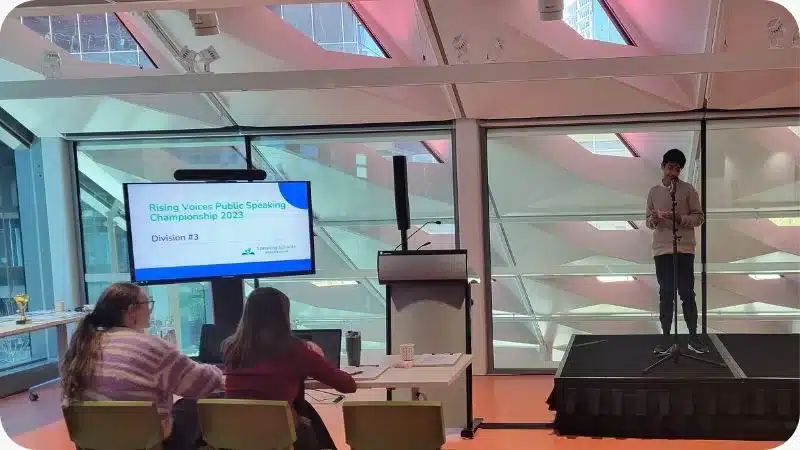
We extend our warmest congratulations to the six extraordinary finalists selected for the Stage #3 Division of the Rising Voices Championship 2023!
Mar – First Place
Kiara – Second Place
Brian – Third Place
Lachlan – Special Award
Ishaq – Finalist
Sumin – Finalist
Special congratulations to Mar, who also achieved the first-place position in the Stage #3 division of the SSA Cup in 2022!
Division #4 (Years 7 – 9)
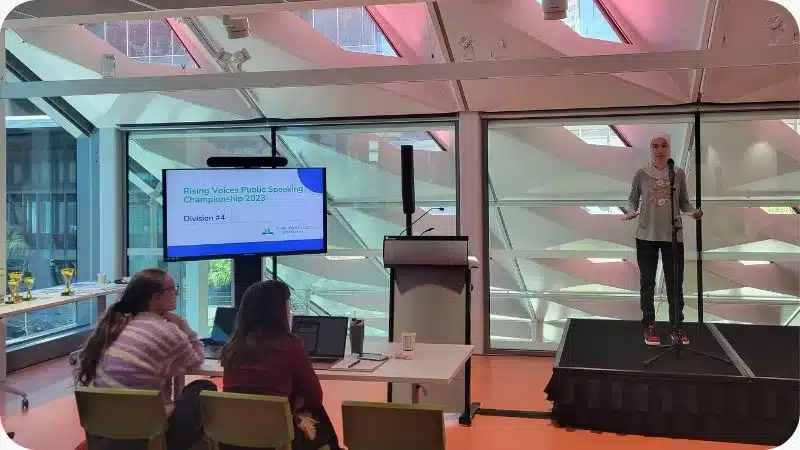
We extend our warmest congratulations to the six extraordinary finalists selected for the Stage #3 Division of the Rising Voices Championship 2023!
Rohan – First Place
Anna – Second Place
Layla – Third Place
Giorgia – Special Award
Dawsen – Finalist
Gurkiret – Finalist
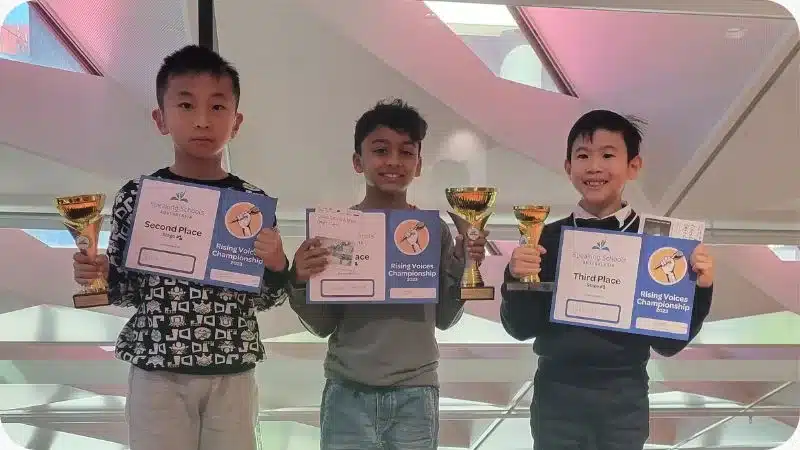
Public speaking has the remarkable ability to empower students, fostering real change within ourselves and our communities.
While it demands hard work and dedication, the potential rewards, on a personal and professional level, are immense.
At Speaking Schools Australasia, we believe that every child should have access to public speaking education as part of their schooling so that they can be empowered to be confident communicators who can advocate for meaningful contributions within their communities.
Congratulations once again to our esteemed winners Ashlyn, Samouel, Mar, and Rohan. May this experience leave a lasting impression on all our finalists, instilling them with invaluable lessons and cherished memories!
We extend our heartfelt gratitude to all those who supported us throughout this event and look forward to more competitions to come – thank you for being a part of our journey!
We are thrilled to announce that Speaking Schools Australasia (SSA) has been named a winner at the North Shore Local Business Awards.
We were recognised for our Outstanding Education Service and are incredibly proud to have been chosen amongst a group of excellent local businesses.
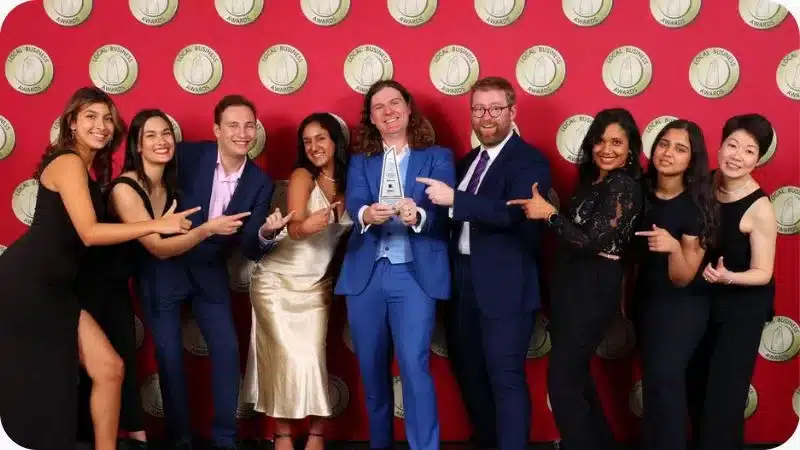
What are the Local Business Awards?
The Local Business Awards are one of the most well-recognised awards in Australia, and recognise & celebrate the contributions and achievements of small businesses across the country.
The aim is to help boost local businesses by fostering a sense of community, promoting local trade, and recognising successful businesses.
These awards cover various categories, from food and drink to education and health, and are a great way for small businesses to showcase their achievements.
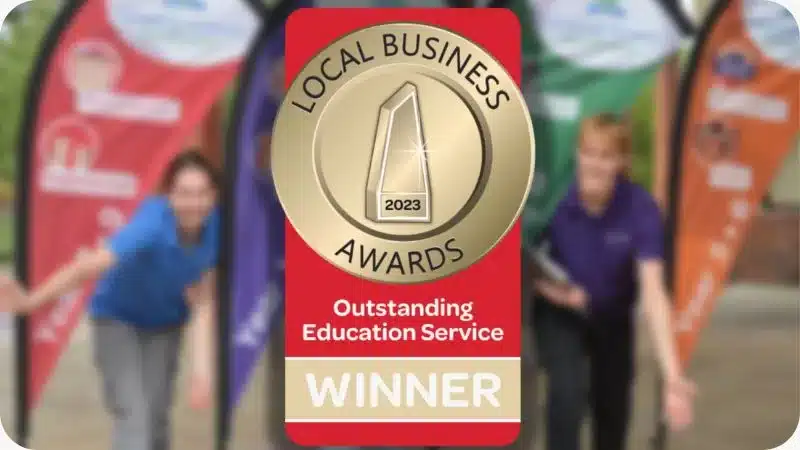
What was SSA chosen for?
SSA was a finalist for excellence in our business outline, features and achievements. We were recognised for our strong promotion, top-quality products and customer service, as well as our success over the past two years. We were applauded for managing and monitoring customer satisfaction extremely well. As educators, this is a fundamental part of our business and we are proud to be recognised for this.
It was a great opportunity to celebrate the successes of small businesses from across Australia, and we were so proud to be recognised as winners in the “Outstanding Education Service” category. The night was also a beautiful moment to meet other people with like-minded goals. It showed us how enthusiastic people can be when it comes to having an impact on the future of our students. Our aim has always been to help guide the next generations to be more confident and to help them achieve success. Winning this award has reaffirmed that we are on the right track and that our hard work is paying off.
This instilled confidence in our team that despite the challenges of the last few years, not only are we doing the right thing, but also that we are part of a larger community working together to help students develop holistically. Our core aim at SSA is to ensure that every student has access to quality education that helps them become confident and successful individuals. Winning this award is a significant milestone for us, and it encourages us to continue striving towards excellence.
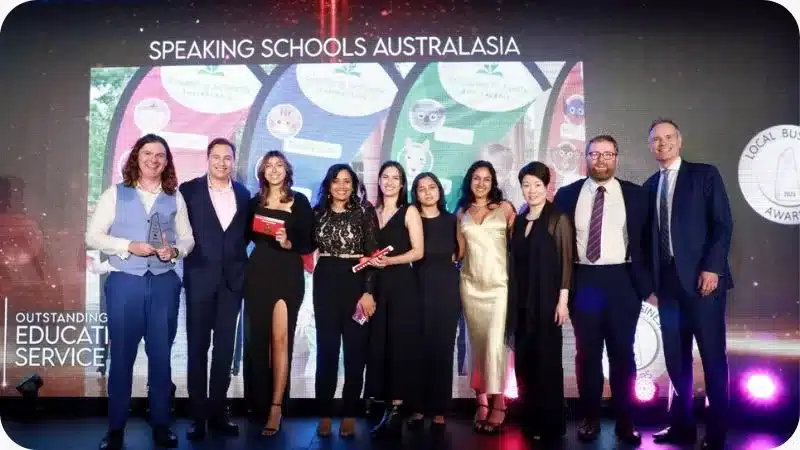
Our Co-Founder’s Words
On the night, our Co-Founder and Managing Director – Mark Slaven – was given the opportunity to say a few words:
I’d firstly like to thank my wonderful team who I have up here with me today – Tennyson, Mayela, Marianne, Anna, Zara, Rani, Belinda and Rob. I’d also like to thank my wonderful wife Steph, who cannot be here this evening…
And then I’d finally like to thank all of the wonderful parents, but most of all I’d like to thank all of the phenomenal students who come in day-in, day-out. We do public speaking and debating coaching, it’s not something easy for kids to learn and it can be quite daunting for them. The fact that our kids give it their all is absolutely amazing, so a big thank you to them.

In conclusion, winning the North Shore Local Business Awards for Outstanding Education Service has been a momentous occasion for us at SSA.
We are proud to have our efforts acknowledged and celebrated, and we remain committed to providing quality education and supporting the holistic development of our students.
We thank the Local Business Awards for providing us with a platform to showcase our achievements and the opportunity to connect with other businesses.
We are also grateful to our staff, students, and parents for their support, which has contributed significantly to our success.
Debating is an increasingly popular activity for school-aged children. In Australia, many schools join competitions where students can debate each other or host their own internal debates. A lot of students can find their first debate to be incredibly exciting but also intimidating. That’s because debating is a very unique activity with lots of new rules and concepts to understand.
Once kids get across all of these new rules and experience their first debate, their next question can often be, “How can I improve for the next one?”. At Speaking Schools Australasia, we believe in learning by doing. Simply being involved in debating and having a go can help to bring loads of improvement on its own. However, it can be really helpful to know some specific things you can do to improve as a debater. That’s why we’ve rounded up our top 5 ways to improve at debating.
1. Build up your general knowledge
In a debate, you get given a topic just one hour (and often even less) before it’s time to deliver your speech! The topic can be about anything and often falls into a broader topic area such as education, politics, sport, environment, or general knowledge. Therefore, knowing more about these general areas can be the best way to improve as a debater! We recommend keeping an eye on current news pieces and collecting interesting facts in a scrapbook or a document under these headings.
Some good sources of news for kids include:
https://www.kidsnews.com.au/news
2. Learn a strategy for prep time
We’ve spoken about the fact that debating requires you to prepare your speech in a short period of time after receiving the topic. This is called ‘prep time. It’s where all three (or four) teammates will come together to work out their plans for the debate and write their speeches. Improving your strategy for prep time is one of the easiest ways to become a better debater!
Get together with your team and decide how long you will spend brainstorming ideas, sharing your thoughts and writing your points. Our top tip is to bring a stopwatch so you can keep an eye on your time management as a team!
3. Get involved in some practice debates!
Learning by doing is the best way to improve as a debater.
At SSA, a huge part of what we do is facilitate debating competitions and workshops that can offer an opportunity for students to get some more debating practice under their belt. Some schools may only participate in one or two debates per term, which can be too slow a pace to see any large improvement in your skills.
We recommend practising regularly and asking for lots of feedback from your coach, your adjudicator or your teacher after each debate – programs like Debating Pelicans, Debating Hawks, Experienced Debating and Practice Debates can really help get some extra experience in!
4. Work on your structure
If you have all the right ideas for the debate, the next most important thing is to learn how to get them across to the adjudicator.
The structure of your speech can play a huge role in this. Just like a narrative, debating speeches should have a clear introduction, body, and conclusion. However, there are some special structures relevant to debating specifically that you should also learn.
One such structure is ‘CMI: Characterisation/Context, Mechanism, Impacts’. You can learn more about the CMI structure using our free video tutorial link!
5. Watch some useful videos online
Improving as a debater is a lot easier when you can learn from somebody who has been working on their skills for years!
Luckily, the internet is full of useful resources you can look at to see how other people approach debating and what the top tips are. Try the Speaking Schools Australasia Youtube Channel, where we have uploaded tonnes of free resources about debating and public speaking.
You can learn about your specific speaker role, how to do rebuttals, and much more just by spending some time on the SSA YouTube!
Following these five steps to improve as a debater can lead to a huge boost in your skills! If you are passionate about debating and want to continue to improve, come along and join us at one of our online or in-person programs, where our expert coaches can help to build you into a confident debater.
By Leah Mercier
The acquisition of general knowledge is an important aspect of growing up. The things kids learn about the world can help them to engage in it in a more meaningful way. For us, building tomorrow’s well-rounded humans is all about fostering the confidence to have curiosity and think critically about world issues.
How Do Debating and Public Speaking Help?
Debating and public speaking are both wonderful platforms for building these skills, as they ask kids to think deeply about their views of the world and to present these in an engaging way to their audience.
Investigating a Current Affairs Topic in Debating
Both Debating and Public Speaking often require students to investigate and analyse a topic from the real world. When debating, the students will discover the topic 1 hour (or some other pre-disclosed window of time) prior to the debate. Within this ‘prep time’, debaters are required to brainstorm and come up with arguments for or against that topic.
For example, on the topic, “That exams should be replaced with assessment tasks,” students might come up with ideas about the impact exams have on mental health, the way that grades affect students’ career paths, and more. They may also draw upon things they have heard in the news, such as the fact that more and more universities are offering early entry before the HSC exam period.
Receiving the topic in this manner, and needing to come up with ideas quickly without access to the internet, is amazing for the development of critical thinking skills.
Investigating a Topic in Public Speaking
Public speaking is often a very personalised experience. Many students receive a prompt or brief to meet and are free to select their own topic to talk about. One of the wonderful things about public speaking is that the process of selecting a topic often encourages introspection from kids about what really matters to them, and what they find interesting in the real world.
We encourage students to find a topic they are really passionate about. The speech becomes a wonderful platform for critically thinking about an issue that impacts their own life or the lives of those around them. Whether the speech is written to entertain, inform, or persuade, a lot of students become inspired to discover interesting facts about their topic through deeper research.
The knowledge building habits that can help kids improve at debating and public speaking
We know that general knowledge is intertwined with both debating and public speaking and is often the ‘x-factor’ that can make kids stand out in competitions. So how can kids improve their general knowledge?
1. Listen to and discuss the news
Make a habit of tuning in to a kid’s news (or adult news) program at least once per week! Try having conversations about what is happening in the world by asking questions. “How do you feel about ‘x’?” and, “What was the most interesting thing you saw on the news today?”
2. Keep a general knowledge book
Grab an exercise book, and create some headings under which to collect some general knowledge. Some good headings include:
- Environment
- Law and Order
- Politics
- Sports
- Education
- Social Justice
- Science and Technology
- General / Miscellaneous
Whenever you hear something interesting, such as a fact or statistic that will be relevant for a long time, write it down in the general knowledge book! You will be surprised how fun it can be to collect knowledge in this way.
3. Get some advice from a passionate coach
Sometimes it can be wonderful to learn from those who have already done debating and public speaking. By joining a public speaking or debating course, you can chat with a passionate coach about which ideas and arguments from the real world would be well-suited to your speech.
General knowledge acquisition is a huge part of debating and public speaking, and a great reason to become involved in these activities. The critical thinkers of tomorrow all start from somewhere, so try out one of our general knowledge acquisition tips today!